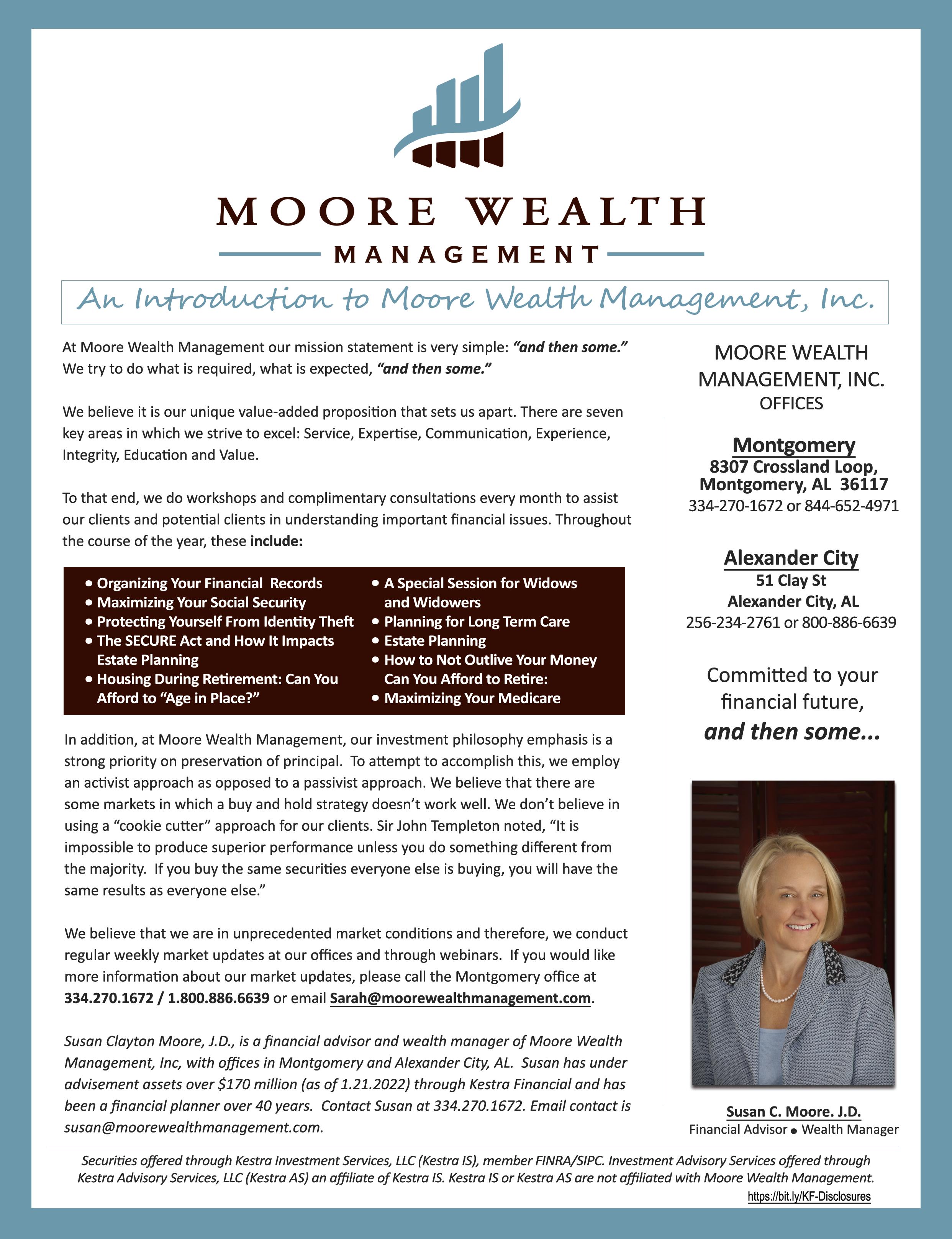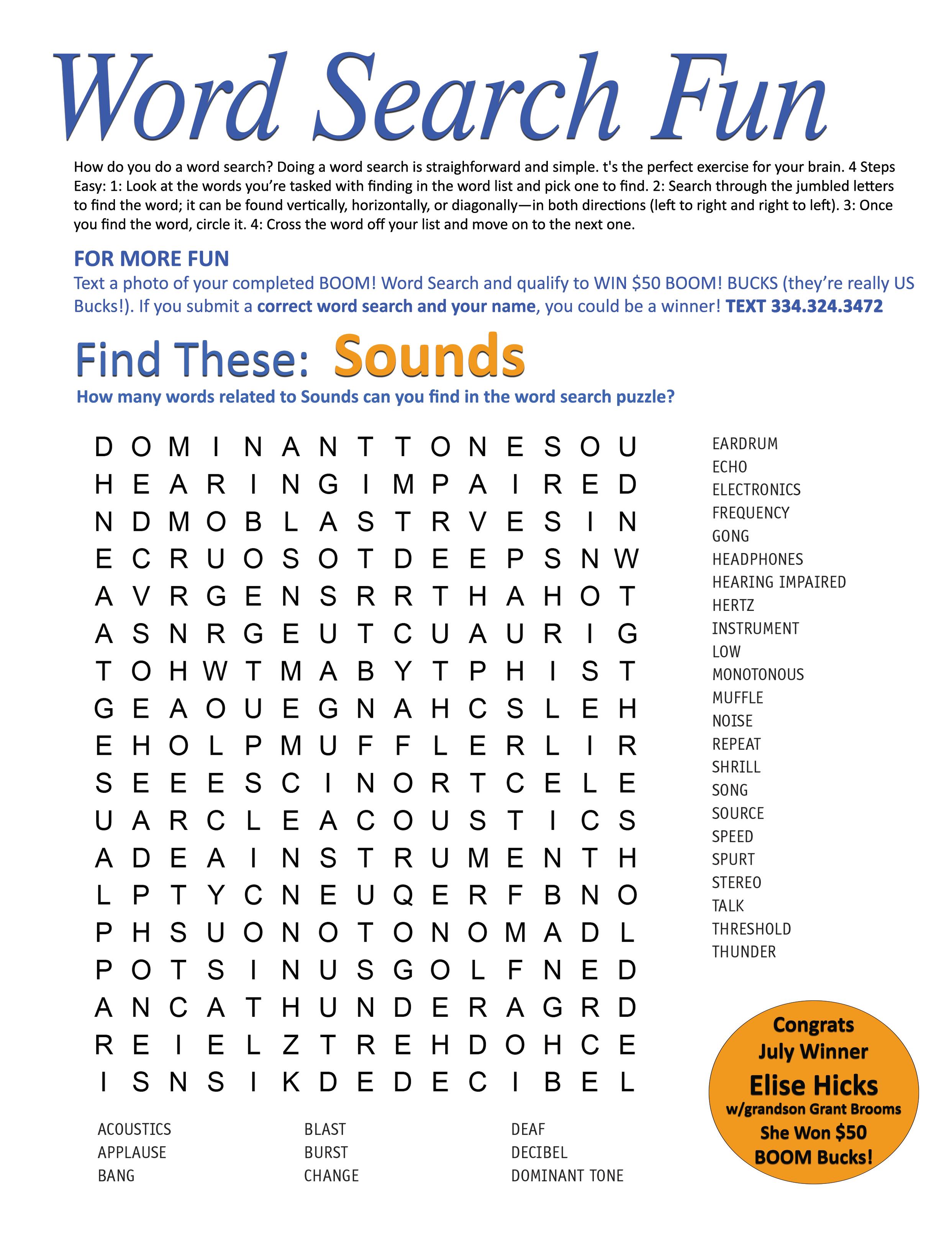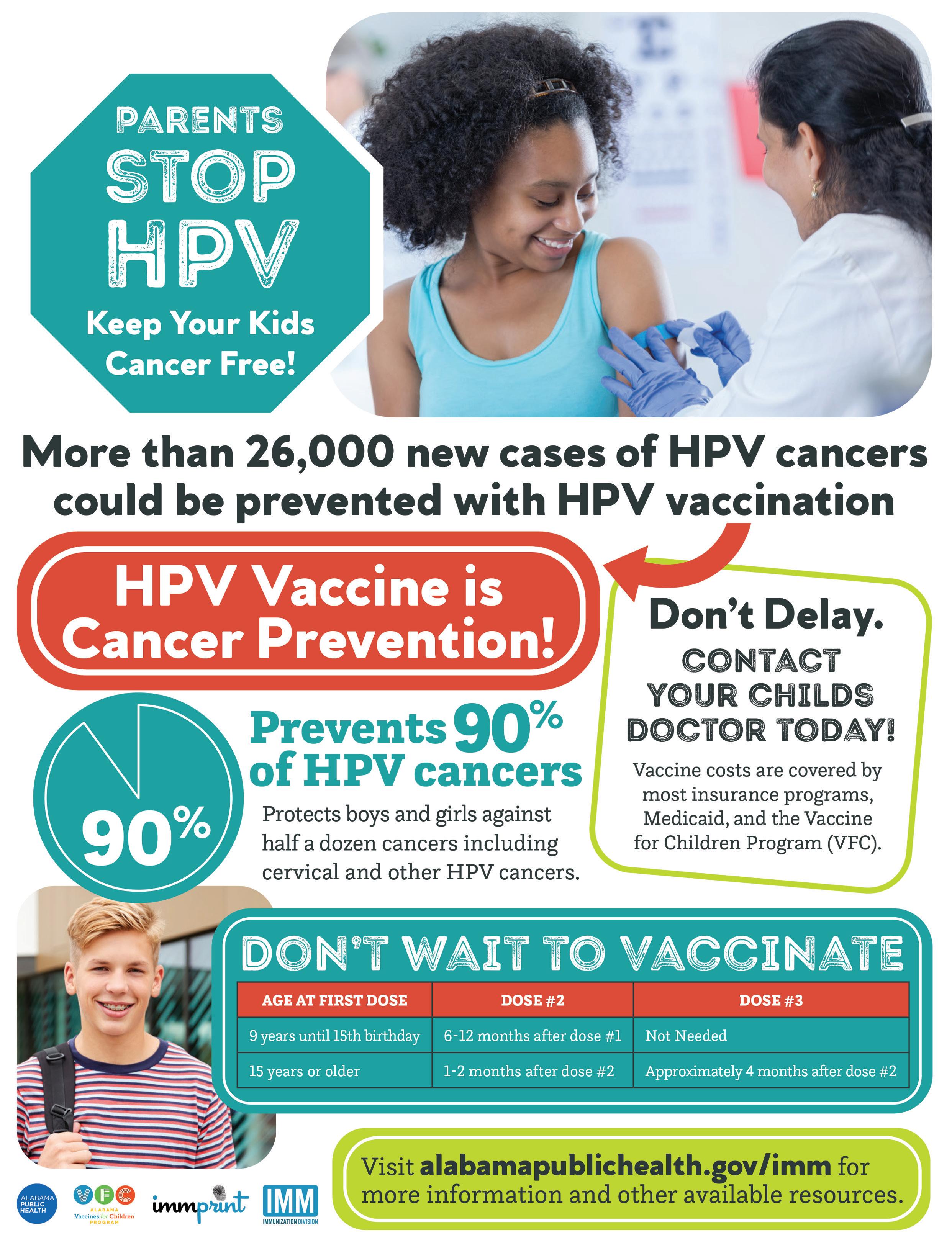
















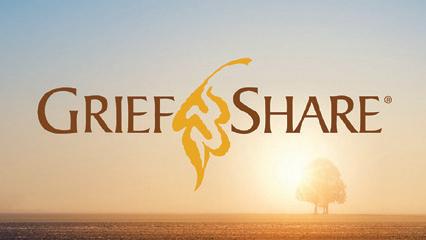
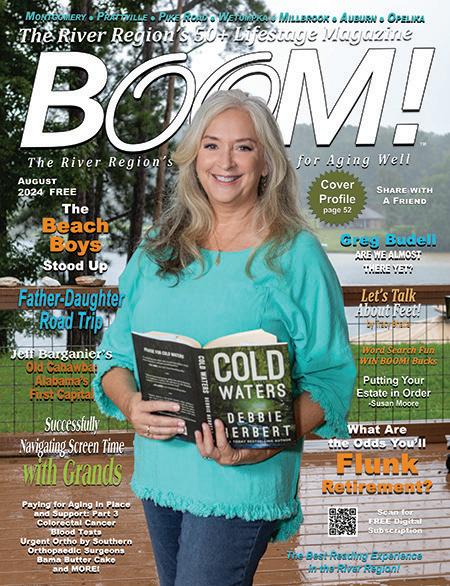
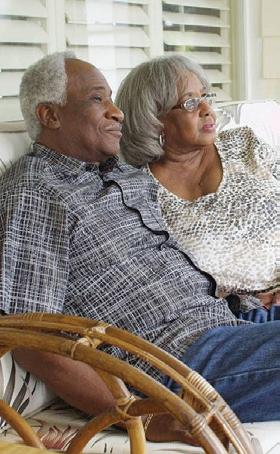





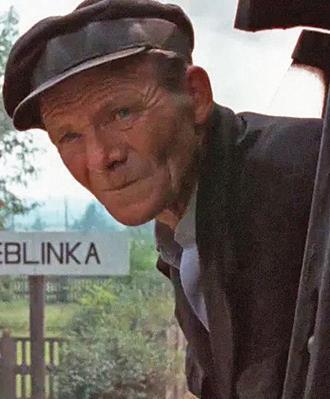





World’s Greatest Places 2024
Opening August 5th
Our story begins 10 years ago in February of 2014 where we, the physicians at Southern Orthopaedic Surgeons, believed there was a need in Montgomery for immediate orthopedic care that did not require going to the emergency room. We felt that we could provide a service for people at a significantly lower cost, a much more time efficient model, and in a protected environment where patients would not be exposed to a waiting room of people with the flu or other contagious diseases. We believed by doing this service ourselves, the patient would have direct access to an orthopaedic specialist who could initiate care, diagnose the problem, provide physical therapy, order diagnostic imaging, and cast or splint the injury on the spot.

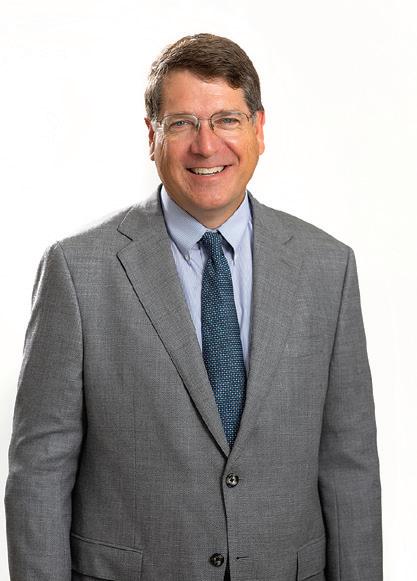
And so Urgent Ortho began, starting with after hours treatment from 5pm to 8pm and a few hours on Saturdays. This was a big success with our patients as a service needed in the area. It really was a win for everyone. It was more efficient, gave better quality of care, and was less expensive than the ER.
A few years ago, Baptist came to us and wanted to partner with us going to a fulltime urgent care model, and we agreed this was a great idea. We chose not to run it on Sundays because we felt our staff needed a day with their families, kind of like Chick-fil-A does. The emergency room was still an option for those days. This partnership ran very well for a few years, but Baptist decided recently to run it themselves and not have us run it for them. We still felt like we had a desire to fill the need of urgent care for our patients and we wanted to have control and supervision of the care. We were
very concerned about continuing the quality of care and maintaining the high standards we had set for our patients. Not to say it wouldn’t happen somewhere else, but we knew it would happen this way.
Another thing we saw a need for was urgent care for work comp patients. Starting our own Urgent Ortho will allow us to see work comp patients immediately after being injured on the job. There is a lot of paperwork involved with work comp claims, and we’re experienced with that. To provide direct to specialist care instead of an ER visit is a more cost effective and efficient entry for employers in the Central Alabama area.
By having our own Urgent Ortho clinic, the physicians at that clinic know they have direct access to every surgeon and specialist in our group to do what’s needed surgically. If there is something they think needs to go to surgery right away, they can pick up the phone, call the doctor on call, and make arrangements for surgery immediately. Most things that come into a walk-in clinic can be sent to follow up in our office in the next
By Roland Hester,
few days, and most of the injuries don’t require surgery. But it is pretty common, maybe two to three times a week, to have something that needs to be addressed right away. For those reasons, we thought we should continue what we started 10 years ago with Urgent Ortho at the quality and level of care our patients deserve. This is why we are opening back up the original orthopaedic walk-in clinic in the state of Alabama.
So many of the injuries seen in Urgent Ortho tie in to our sports medicine program. Athletes come in and get seen immediately, get treatment and a diagnosis, and find out if they have a serious injury or if it’s ok to play in tomorrow night’s game. It’s very beneficial, especially after-hours.
For older patients, older people still play sports- they play pickleball, they golf, they get injured and still need sports medicine trained physicians to evaluate their injuries. They fall down more often, and we see a lot of injuries from fallsbroken wrists, broken fingers, sprained ankles, ankle fracture- and in our over 50 population, those injuries are very common. The fractures are more common in the 50 and older population than in the general population.
Now, if you’re in a major car wreck and knocked out cold with multiple injuries, the walk-in clinic is not where you need to go. But for the vast majority of complaints, you can walk-in and we take care of it in a much more timely, much more cost effective manner with an extremely high quality of care.
Chase Corner (across from Eastchase) 1470 Taylor Road, Suite 109 Montgomery, AL 36117 334-613-9000
Opening August 5th


Publisher/Editor
Jim Watson
334.324.3472 cell/text jim@riverregionboom.com

Contributing Writers
Jeff Barganier
Tracy Bhalla
Greg Budell
Debbie Herbert
Roland Hester, MD
Linda Hicks
Anne Elizabeth McGowin.
Susan Moore
Kate Ramsay-Scott
Nick Thomas
Mark S. Walton
Chris Wheatley
Cover Photography
Photography by DiAnna Paulk photographybydiannapaulk.com
Advertising
Jim Watson, 334.324.3472 jim@riverregionboom.com The



A friend of mine recently shared that he was telling his son and grandchildren to pay attention to what was going on in the world around them because we were experiencing some very historical times... He was referring to the assassination attempt on President Trump, the stepping down of Joe Biden to not be a candidate for the presidency after more than 14 million people voted for him in the Democrat Primary, and the installation of Kamala Harris as his replacement. An act some have called the first legal American Coup, especially if she were elected in the Fall.
Yes, these are historical times and most alarming. What will America feel like after the election…deceived, rigged, pessimistic, manipulated, or maybe un-American? Most of my grandchildren can now vote, but I’m not sure they know how to make an informed vote. In recent conversations, they seem uninterested in who leads them or who will restore the parts of the American psyche that have been dramatically changed for the sake of power. The Baby Boomers have survived much, and no doubt have caused much of our current deterioration as a country. Will we change course for the better or will we accept the new status quo? Maybe if we all seek the truth before we vote, we can restore what has been lost. Know the truth.
This month’s cover profile is Debbie Herbert, an author of nearly 20 books who lives in Elmore County. Debbie is one of those rare people who had a dream as a young adult to become a writer, went to college received a journalism degree, and then got sidetracked by taking a job with the Alabama Prison System as a prison guard! After her retirement, she got back after her dream and became a best-selling author of romance and suspense novels. Was it easy? No, but it has been a rewarding experience that we think you will find interesting and perhaps inspirational; after all, doesn’t everyone want to write a book when they retire!? We hope you enjoy getting to know Debbie as much as we have.
There’s plenty more for your reading pleasure like an interesting father-daughter road trip all of us would love to experience with a child. Greg Budell shares his observations about the world we live in with insight and wisdom. We also have features from Jeff Barganier and his journey back to the original capital of Alabama, and now I want to make the trip, too! Have you ever thought you might flunk retirement? Mark Walton has a new book out about your odds of doing just that. Check it out and see where you stand. When it comes to grandparenting, we all deal with the Grands and their screens. We have some tips to help you navigate that modern-day. Finally, we have a dirty about the Beach Boys, which I think is the band that everyone in America has seen live in concert at least once, but the story’s about how they fought the British music invasion and did pretty well.
There’s plenty more to read this month, including a new Word Search worth $50 BOOM! Bucks, if you can complete it, text me your name for our monthly drawing. Congratulations to Elise Hicks and her grandson for submitting the July winner! being our June Word Search Winner! Thank you for taking a few moments of your valuable time to read the August issue and maybe share it with friends and family; we appreciate the relationship we have with each of you. Stay cool this summer! Age Well, my friends.
Jim 334.324.3472 cell/text jim@riverregionboom.com
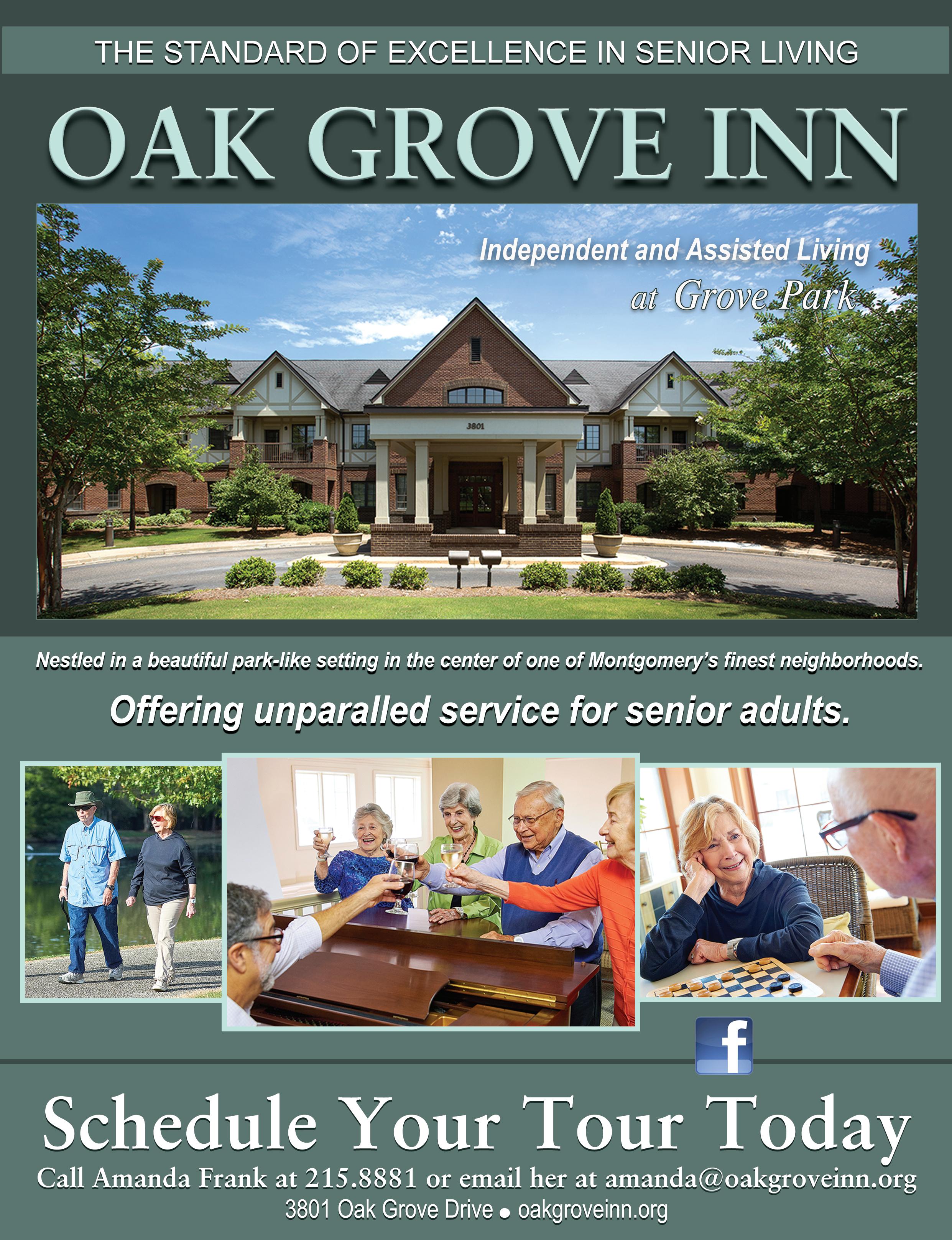

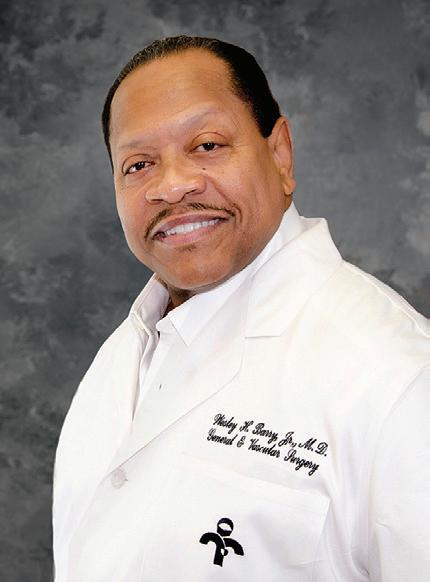
Wesley Barry, Jr, MD
1722 Pine Street, Suite 904 Montgomery, AL 36106
334-265-9225

Manuel Caceres, MD 1722 Pine St., Suite 201 Montgomery, AL 36106
334.264.8741
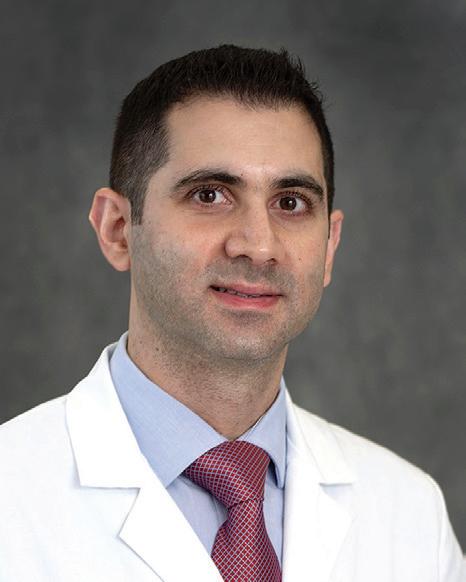
Jad Chamieh, MD 1722 Pine Street, Suite 201 Montgomery, AL 36106 334-293-6858
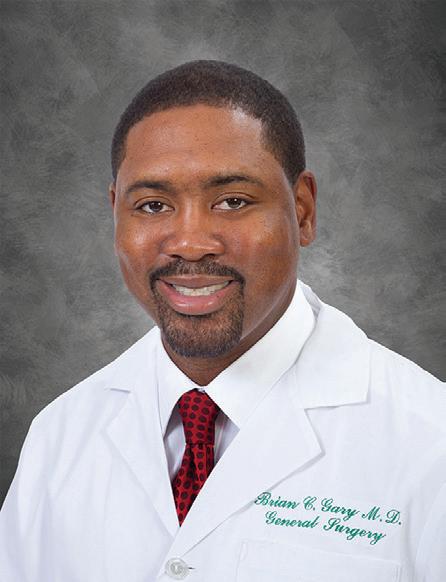
Brian Gary, MD
1722 Pine St., Suite 201 Montgomery, AL 36106 334.293.6858
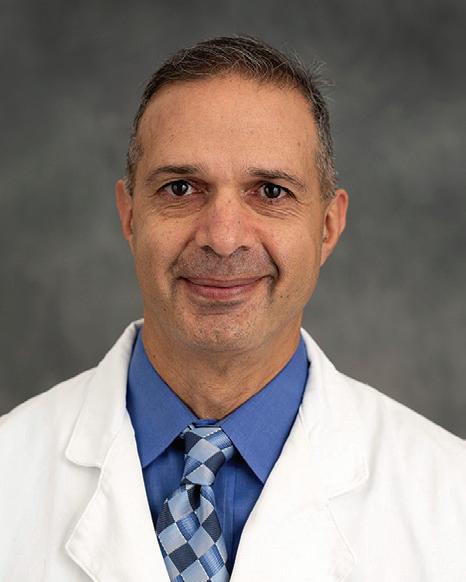
Parham Mora, MD
554 McQueen Smith Road N. Prattville, AL 36066
334.361.6126
A big misconception about general surgeons is that they are generalists and not specialists. In fact, they are quite specialized in their training, but this specialized training is over a very broad area. Their training may include rotating from different areas such as trauma, colon-rectum, plastic surgery, endocrine, critical care, cardiac, or transplant.
General surgeons don’t just operate on patients, they also evaluate patients who are sick before surgery, and oversee care after surgery. Most surgeries in a hospital are performed by general surgeons. They are privileged to follow a patient’s full journey from diagnosis and treatments through recovery. This allows general surgeons to connect with their patients.
A general surgery practice depends on the needs of patients around them. Many will also Sub-Specialize. Examples are breast, trauma, cancer and weight loss surgery. Our general surgeons have expertise in multiple types of surgery, including:
• Abdominal surgery • Bariatric (weight loss) surgery • Cancer surgery • Digestive tract biopsy or resection • Endocrine system assessment and repair • Head and neck surgery • Hernia repair • Pediatric surgery • Trauma surgery
Whenever possible, we use minimally invasive surgical techniques. These methods allow us to use smaller incisions that could shorten your hospital stay and speed your recovery time.
We encourage you to talk openly with our surgeons. Consider asking your doctor:
Is this an outpatient or inpatient surgery? What are the possible complications of this surgery? What kind of anesthesia will be used? Will you need any special preparation prior to surgery? Do you need to stop taking any medications before surgery? What type of care will you need at home? When can you expect to return to your regular activities? What can you do to help speed your recovery?
For more information visit www.jacksonclinic.org/specialty-care/general-surgery/


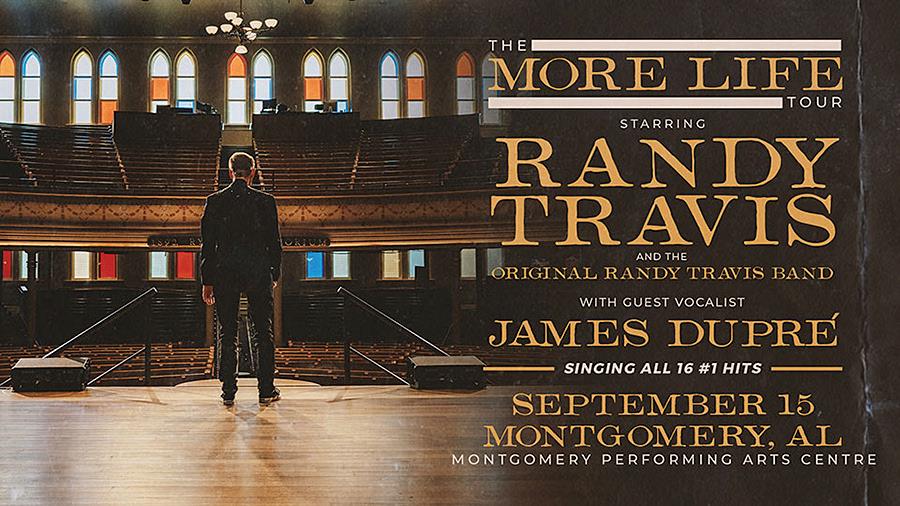
Sunday, September 15, 2024
Start Time 6 pm
MPAC-Downtown Montgomery
With lifetime sales in excess of 25 million, Randy Travis is one of the biggest multi-genre record sellers of all time and a recent inductee into the Country Music Hall of Fame class of 2016. His honors include seven Grammy Awards, 11 Academy of Country Music statuettes, 10 American Music Awards, two People’s Choice awards, seven Music City News awards, eight Dove Awards from the Gospel Music Association and five Country Music Association honors. In addition, three of his performances earned CMA Song of the Year honors: “On the Other Hand” (1986), “Forever and Ever Amen” (1987) and “Three Wooden Crosses” (2002). To date, he has 23 No. 1 singles, 31 Top-10 smashes and more than 40 appearances in feature films and television shows to his credit. Tickets at Ticketmaster.com


The cover of BOOM says it’s August. Is it safe to come out?
July began with great promise: Biscuits Baseball in an air-conditioned suite. Fireworks. Snacks at the Rooftop Bar in downtown Montgomery. A 2-day trek to an Orange Beach resort followed. A hurricane (Beryl) in the southern Gulf made for precocious waves (I almost got ‘pantsed’ in the surf). Dinner at Big Fish (superb!). A movie (“Kinds of Kindness”) I’m still trying to figure out. No problems with holiday weekend traffic and enough sand turning up in the unpack to keep a three-year-old busy for a week.
"A true story from the Greg files"

thing- get on the air ASAP. Our name is NewsTalk, and this was huge news, not to mention an event people would want to talk about.
The day, the month, took a 180-degree turn. I left the sweet cacophony of shrieking, playing children for a surreal sequence of unbelievable events that would last well beyond that day.
attacks of 9/11. Each one of those events posed unique issues, but the common denominator to all was the “fog of news.”
By 8 PM, we were ready to sign off after 2 non-stop hours distilling headlines. There was an assassination attempt on Donald Trump. He was hit in the ear and survived. He stood up and shook his fist at his then-unknown assailant as if to say, “You missed, ya b------s.” The shooter was dead.
Then it was back to work. The month continued rather benignly until 5:15PM on the thirteenth day of July, a Saturday. I was attending the festive 7th birthday celebration of Steven, the genius whippet of my attorney and friend Jacquelyn Tomlinson. It was a Mario Brothers themed event. Jacquelyn is a kitchen magician, and as I marveled at her handcrafted, chocolate-mustachioed cookies, I heard the familiar “ding” of my cellphone signaling a new text message. I pulled the phone up, expecting an inconsequential note from a friend, and was instead greeted with “Trump Assassination Attempt At Pennsylvania Rally.”
These are the moments when Superman finds a phone booth (much harder these days!) and puts on the red cape. For a career radio guy like me, it meant one
I began communicating with my morning co-hosts, Rich Thomas and Jay Scott on the drive into town. Thankfully, Jay was already in our building finishing up his show for gamers, “In-Game Chat” (listened to by millions of nerds world-wide!). Rich was parked at home, gathering information from his 11-screen video wall (which I’ve dubbed ‘Seizure City’).
On the ride in, I recalled other major events I’d covered on the fly and the challenges they presented. The 1981 murder of John Lennon. The assassination attempt on my favorite President, Ronald Reagan, in ‘81. The Challenger explosion in ‘86. The terror
At first, the event seemed cut and dried, with details such as motive and security lapses yet to be learned in the wake of the biggest story of 2024.
The wake was far larger and more bizarre than even I could have imagined in these surreal times.

Seriously, surely this would not be a repeat of JFK and 11/22/63! Well, I am serious, and don’t call me …
Everything changed. Trump’s opponent, Joseph Robinette Biden allegedly called his opponent with sympathies, and in an address to America the next night, called for unity. The day after his whispered plea to the country, Joe was back on the attack accusing Trump of being a “threat to democracy” and yada yada yada.
If I’m not mistaken, Trump served 4 years in the Oval Office without disturbing the feathers on democracy’s wings.

Following Joe’s creepy admonishment, we then were subsequently treated to the assassination of his campaign (via blather, not bullets). I’d like to include Biden’s monumentally disastrous debate performance as a July event (June 27, close enough), but it served as the template for additional insanities.
Despite poor polling, Joe insisted he was the only man to beat the newly wounded Trump. Until the following Friday, Joe stubbornly refused calls to give up now that his long-concealed mental feebleness was exposed in the "debate." Even Barack Hussein Obama said, "Joe, ya gotta go!" Joe still refused to budge until he was budged by an offer he couldn't refuse. He caved and announced to America that he would be "passing the torch."
Or was he passing the torture of his numerous failures? Things moved swiftly. Headspinningly so.
In the interim, the failures of the Secret Service came under Congressional scrutiny. Testifying before the House, Director Kimberly Cheatle admitted the once-respected agency committed a few errors. Even though dozens of witnesses tried to get the SS to notice the man on the roof (who got through security while carrying a telescopic sight), agents were not dispatched because the roof was "sloped." As most roofs are! A 70-year-
old Senator climbed that same roof without difficulty. It's not like alleged shooter Thomas Matthew Crooks (another 3-namer!) was firing from a
chalet in the Pennsylvania Alps. Cheatle had no intention of resigning until polling data required a call from the same people who budged Joe out the door.
While this drama played out, the same people shrieking "threat to democracy" were busy subverting the primaries and Democratic convention delegates to make cackling Kamala Harris the new presumptive nominee to battle Donald Trump on November 5.
Biden, in his bye-bye address, urged his party to win at the "battle box."
Basically BOOMers, what we saw was an assassination attempt on one party's candidate (followed by a snappy convention) and a soft-core coup on the other side. In less than 2 weeks.
I asked JFK expert Mark Groubert if our grandchildren would be discussing 7/13/24 and trying to figure out what really happened. "Probably", he said. "But who the hell thought we'd see what I'm calling an 'Ice Cream Coup' a week later?".
"Ice cream coup." I like that.
What's next, August?
Stay tuned, BOOMers!
Share your thoughts on my experiences or other comments via email at gregbudell@aol.com. It's always fun to hear from BOOM! readers.
Greg Budell lives in Montgomery with his wife, Roz, and dog, Brisco. He's been in radio since 1970, and has marked 17 years in the River Region. He hosts the Newstalk 93.1FM Morning Show with Rich Thomas and Jay Scott, 6-9 AM Monday - Friday. He returns weekday afternoons from 3-6 PM for Happy Hour with sidekick, Rosie Brock. Greg can be reached at gregbudell@aol.com

The Summer Olympics will conclude on August 11 and one new event added this year might be surprising: Breaking – short for breakdancing. Yes, the phenomenal 80s dance craze is now an Olympic event. Well heck, let’s just bring back Jousting and Chariot Racing for the 2028 games.
Although not new this year, since they were first introduced in the 2020 Tokyo Games, events that involve standing on boards without falling off (aka Skateboarding and Surfing) will return for the Paris Games. While always popular activities with the younger crowd, my youthful attempts at both were dismal failures. When it came to balancing on fastmoving narrow planks of fiberglass, whether aquatic or terrestrial, I had the coordination of a nearsighted drunk with gout in high heels.

However, along those lines, maybe it is time for some more traditional Olympic events to be updated as well. Standard Diving, Fencing, and Wrestling are all rather passé, don’t you think? In 2028, how about introducing Dumpster Diving, Chain-link Fencing, and Alligator Wrestling, although the latter might require medals to be awarded posthumously.
There have also been a few modifications or additions to previous events this year. For example, Climbing (also introduced in Tokyo) features a new speed event where “athletes will climb side-by-side up a 15-meter wall, racing for time” according to NBC. I’m just not sure the frantic accelerated ascent of anything vertical should be encouraged, lest it lead to rapid uncontrolled descent (aka falling).
For those of us of advancing years and with physiques more akin to Sylvester the Cat rather than Sylvester Stallone, the Olympics is purely a spectator event. Nor can the average person invest the time or money needed to achieve an elite athletic skill. Wouldn't it be fantastic if future events could be added so everyday homeowners might have a chance to compete? Who wouldn’t want to try out for Synchronized Hedge Trimming, Extreme Vacuuming, or the
Garbage Bag Throw? New events for techies could give them a chance to display their talent, too: What about the iPhone Toss? Speed Tweeting? Or Balance Beam Texting?
Even I could train for the Stationary Mountain Biking team. I might take a crack at Greco-Roman Mixed Beach Twister and would be willing to suffer a few minor dislocations if it meant getting tied up in knots with the right opponent … like Jennifer Lopez. Pommel Horse Whispering or Mechanical Bull Roping could be possibilities, too. And I don’t think I’d even need a coach to try out for the Synchronized Cary Grant Impersonating team.
However, after a lifetime of constructing desks, entertainment centers, and bookcases from ready-to-build furniture companies, I believe my best chance to medal would be in Rhythmic Furniture Assembly Cussing. I’d have a real chance at the Gold in that event.
Nick Thomas teaches at Auburn University at Montgomery in Alabama, and has written features, columns, and interviews for many newspapers and magazines. See www.getnickt.org


The National Institute on Aging suggests there are many areas of support services that are available to assist an individual who would like to age in place at home or in his/ her desired environment. This article focuses on medication management, grocery and meal delivery services, emergency medical alert systems, and driving/transportation. These are not the only available services that may be needed when aging in place but these provide examples of assistance that may be available.

The dispensing and taking of medications can be tricky, especially if taking multiple medications daily. For example, some people struggle to set up their own medication boxes with the right medication at the correct dose at the prescribed time. Assistance with medication management may be beneficial. Depending upon the needed level of assistance, this service may be provided by hiring a home health nurse to fill a pill box weekly or having a home care company call or visit daily to remind the person to take their medications. Another option is a pill dispenser to dispense medications at a certain time each day. Other offerings include pre-packaged medications that can be reviewed by a pharmacist each month and mailed/delivered in a 30-day supply, packaged with the days and times to take them.
Grocery and meal delivery services look differently depending on where you live. Most areas have Shipt, Instacart, and/ or grocery stores that will deliver for a monthly or yearly fee. For example, many Wal-Marts and Targets allow
customers to order online from an app on a phone or computer. Next, pick up the purchases at the store at a designated time by parking in a marked parking slot with an employee placing them in the car.
Grub-Hub, and Door Dash are a couple of the food delivery services that deliver restaurant food that is ordered through an app, for a service fee. Again, explore grocery and meal delivery services in the area to learn what is available.
Emergency medical alert systems are becoming a frequently used service for those that choose to age at home. Some medical alert systems provide neck pendants or wrist pendants. Some offer fall detection with a two-way conversation; others just have a button on the pendant that needs to be pushed when a fall occurs, or help is needed. Generally, these pendants immediately call 911 and then the contacts listed by the purchaser. A medical alert system may assist those aging in place to continue to live independently.
Driving is also a challenging topic as we age. The decision to stop driving is sometimes made by an individual
and sometimes influenced by family, friends, insurance companies, and/or medical personnel. The decision to no longer drive can lead to the need for transportation services. The type of transportation service needed depends on the level of assistance necessary to move about. For example, some services require individuals to be able to walk freely on their own; others provide assistance to those who need to transport oxygen, wheelchairs, rollators, and walkers. Private transportation services charge a fee and require an individual to make an appointment time. Depending on the area and the health of the individual, public transportation may be an option but make sure it is safe before using public transportation. In some areas, the Veterans Administration will provide transportation for veterans for little or no charge so check your area to see if you are eligible. Also, most home care agencies will allow companions to transport clients, but make sure when interviewing a home care agency that transportation of a companion is discussed and clarified.
Aging in Place may be possible with extra services. This article does not list all available or necessary services. Each person’s needs and circumstances are unique.
Senior Law Solutions, LLC offers a variety of opportunities to assist individuals and their families with aspects of Elder Law Care, Estate Planning, and Life Care Planning with individualized plans. If you have questions or want to learn more visit www.seniorls.com or call 334.758.9400
Alabama State Bar Requires the Following: “No representation is made that the quality of the legal services to be performed is greater than the quality of legal services performed by other lawyers.” Responsible Attorney: Anne Elizabeth McGowin.
Medically, mini heart attacks are referred to as silent myocardial infarction or silent ischemia. Laxmi Mehta, MD, FACC, FAHA, a cardiologist and director of Preventive Cardiology and Women’s Cardiovascular Health at The Ohio State University Wexner Medical Center says, “A mini or silent heart attack may present with minimal, unrecognized, or no symptoms at all.” When they do appear, symptoms can range widely and even include more traditional signs of heart distress, like chest discomfort, shortness of breath, nausea, lightheadedness, and jaw pain.
Recognizing even the most subtle signs of a mini heart attack is essential, as early detection and treatment are key to mitigating the severe health implications that can follow a heart attack.
1. Indigestion
Dr. Mehta suggests experiencing what seems like a routine bout of indigestion can be misleading and is often brushed off. Mike Sevilla, MD, says his clinical encounters echo this caution and notes that his patients have sought over-thecounter remedies like Tums, expecting relief. Yet, when these familiar solutions fail to alleviate the discomfort, it’s a sign that the problem might not lie within the stomach but could indeed be a matter of the heart.
2. Feeling like you strained a muscle Pain in your neck, chest, or upper back might feel like you’ve “pulled” a

muscle, making it easy to misinterpret as something minor. However, Dr. Mehta and Dr. Sevilla warn against quickly dismissing such discomfort. These symptoms can be hints of a mini heart attack rather than mere signs of overexertion.
3. Prolonged, excessive fatigue
Feeling overwhelmingly tired for an extended period of time can be more than just a sign of a busy week or a poor night’s sleep. Dr. Mehta points out that this profound, unrelenting fatigue is a symptom many might not immediately connect with heart health. Yet, this type of weariness warrants attention beyond the usual remedies of rest or caffeine. When exhaustion seems disproportionate to your daily activities, it could be a subtle hint from your body that something more serious, like a mini heart attack, may be at play.
4. Difficulty breathing may be a mini heart attack symptom
It’s common to experience shortness of breath after physical exertion or during
moments of stress. However, Dr. Sevilla offers an essential piece of advice: If this difficulty in breathing doesn’t improve with a moment of rest, it shouldn’t be overlooked. Persistent breathlessness, especially when you’ve had a chance to relax, could be a warning sign of a mini heart attack.
5. Flu-like symptoms
During this time of the year, it’s almost expected to experience the all-toofamiliar signs of the flu, including cough, congestion, and fatigue. Dr. Sevilla cautions against taking these symptoms at face value, especially for individuals identified as having a higher risk for heart issues. He advises that when these flu-like symptoms show no signs of improvement, it’s important to consider the possibility that they could be pointing to something beyond a seasonal virus.
Here’s what you can do about mini heart attack symptoms: If you’re concerned that you might have experienced a mini heart attack, Dr. Mehta stresses the importance of medical intervention: “Silent heart attacks [or mini heart attacks] may increase your risk of heart failure and stroke, so it’s important to seek medical care if you believe you may have had a silent heart attack.” She also advises not to overlook any symptoms—even the more subtle signs.



1 cup unsalted butter, softened
2 cup sugar
5 large egg, room temperature
2 1/2 cup all-purpose flour
1 teaspoon baking powder
1/2 teaspoon baking soda
1/2 teaspoon salt
1 cup buttermilk
1 tablespoon vanilla extract
1 cup finely chopped pecans
For the butter glaze
1 cup sugar
1/4 cup water
1/2 cup unsalted butter
2 teaspoons vanilla extract
Instructions:
< Preheat the oven to 325°F and grease and flour a 10 to 12 cup Bundt pan.
< Use a mixer to cream the butter and sugar together until light and fluffy – about 5 minutes. Add the eggs, one at at time, mixing well after each addition.
< In another bowl, whisk together the flour, baking powder, baking soda, and salt.
< Turn the mixer on low, and add about half of the flour mixture. Mix well. Add about half of the buttermilk and mix well. Then add the remaining flour mixture and mix well. Add the remaining buttermilk and mix well. Add the vanilla and pecans and mix to combine.
< Pour the batter evenly into the prepared pan. Bake for 50 to 60 minutes – or until the cake is just starting to pull away from the sides of the pan and toothpick inserted into the center comes out clean.
< Use a skewer or toothpick to poke holes all over the cake.
< Make the glaze by combining the sugar, water, and butter. Cook over low heat until the butter has melted and the sugar has just dissolved. Do not allow to boil.
< Remove from the heat and add the vanilla; stir well.
< Pour the glaze over the cake while it is still in the pan – paying special attention to make sure the glaze drizzles down into the holes. Reserve about 1/4 cup of the glaze for later. Allow the cake to cool for about 30 minutes in the pan before placing a serving platter over the pan and inverting the cake onto it. Drizzle the reserved glaze over the cake. Source: https://southernbite.com/bama-butter-cake
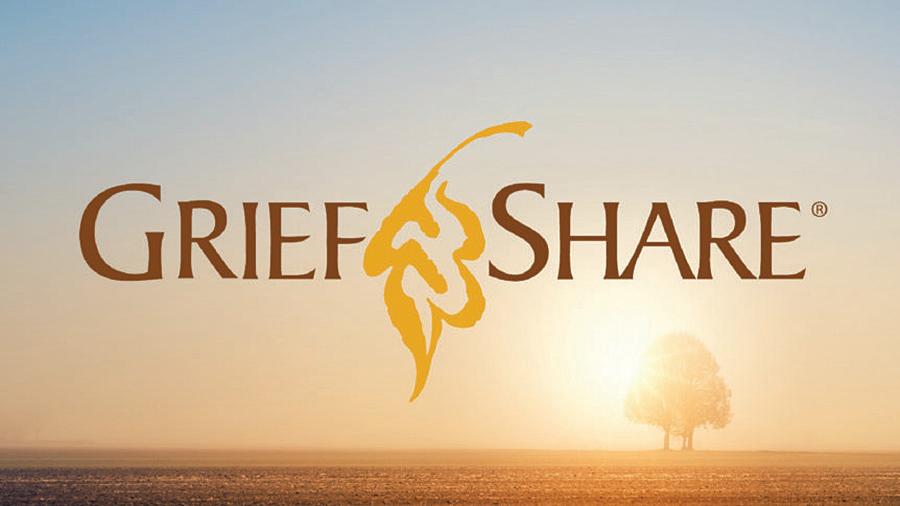
GriefShare Support Group
This GriefShare group is offered for anyone who has lost a loved one. We use the new GriefShare 4.0 video-based curriculum followed by discussion concerning the stages of grief, the storms that come with it, and ways of dealing with loss
Contact BJ Nave below with any questions.
Frazer Church-East Sanctuary 6000 Atlanta Hwy Montgomery, AL
Sep 4, 2024 10:00 AM–12:00 PM Weekly on Wednesday until November 20, 2024
CONTACT
BJ Nave rnave@frazer.church
334.495.6343


A great documentary makes for one of the more edifying experiences available, period — it shows us something we didn’t already know, or gives us a better understanding of something we thought we knew. But what makes a documentary qualify as one of the best of all time? We’ll define it not just as a film that illuminates a particularly substantial topic to enduring effect, but a film that has consensus regard. The following documentaries are works that show up on a multitude of best-of lists, from industry polls to culture magazines, and more.
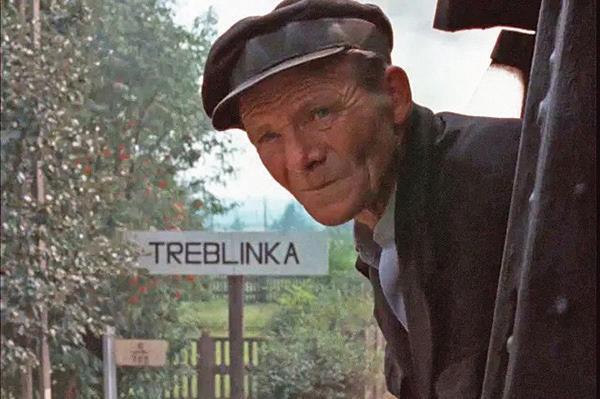
When Shoah was released in 1985, Roger Ebert called it “one of the noblest films ever made,” and its regard hasn’t slipped since. Director Claude Lanzmann spent 12 years interviewing survivors of concentration camps at Auschwitz, Treblinka, Chelmno, Sobibor, and Belzec, as well as former German SS officers and the Polish townspeople who lived in the surrounding areas. Lanzmann famously eschewed archival footage, comprising the entirety of the nine-hour film with interviews intercut with location footage. It’s a powerful, ponderous approach that grounds Shoah in the humanity of the aftermath of the Holocaust, versus dusty newsreels, which risk feeling detached. It is not an easy topic to take in, but as Ebert concluded, “Claude Lanzmann celebrates the priceless gift that sets man apart from animals and makes us human, and gives us hope: the ability for one generation to tell the next what it has learned.”
Todd Douglas Miller’s documentary about the moon landing mission takes the complete opposite approach from Shoah. Constructed from hundreds of reels of previously unseen footage and 11,000 hours of audio that NASA gave Miller access to, Apollo 11 is, in the director’s own words, “an all-archival experience.” The subject of space is, by nature, visually mysterious, and Apollo 11 shows the viewer exactly what we want to see, via footage of space exploration as it happened. Apollo 11 is a visual masterpiece, frequently stunning in its beauty, and those never-before-seen images make for a more revealing picture than any previous documentary about the moon landing. interviews intercut with location footage. It’s a powerful, ponderous approach that grounds Shoah in the humanity of the aftermath of the Holocaust, versus dusty newsreels, which risk feeling detached. It is not an easy topic to take in, but as Ebert concluded, “Claude Lanzmann celebrates the priceless gift that sets man apart from animals and makes us human, and gives us hope: the ability for one generation to tell the next what it has learned.”
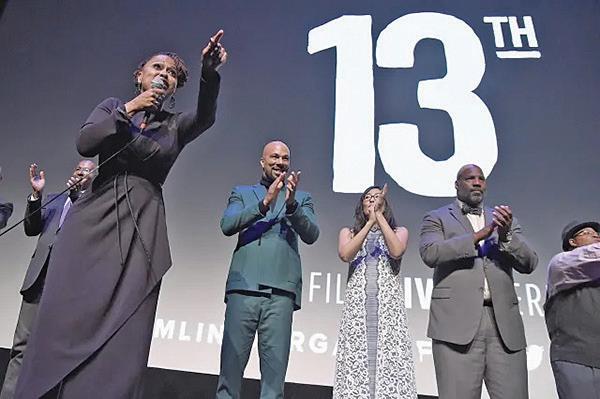
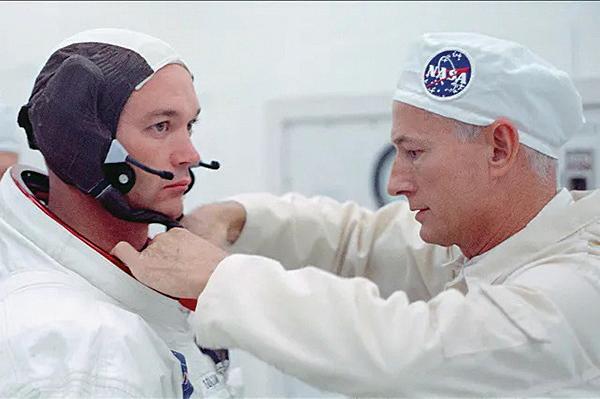
Named after the constitutional amendment that outlawed slavery, Ava DuVernay’s film contextualizes the evolution of race relations in the U.S. along with the history of the American criminal justice system. It was nominated for an Academy Award for Best Documentary; it won a BAFTA Award, a Peabody Award, an NAACP Image Award, and many other film critic awards. 13th weaves together interviews with scholars, activists, journalists, and politicians that decisively illuminate inequity in criminal justice. The result is a potent document that invites the viewer to, as DuVernay puts it herself, “get to a place where we just do better as Americans.”
Raoul Peck’s Oscar-nominated documentary uses a rich amount of archival material to piece together a vision of James Baldwin’s unfinished book on race in America, Remember This House. Samuel L. Jackson narrates the 30 pages of notes on the unfinished manuscript along with letters written by Baldwin, giving an intimate look at Baldwin’s friendships with Martin Luther King Jr., Medgar Evers, and Malcolm X — as well as the lives and deaths of those leaders. As Baldwin wrote, “I want these three lives to bang against and reveal each other as in truth they did,” and the power of that intention, along with found footage and present-day contextualization from Peck, is what makes this documentary exceptional.

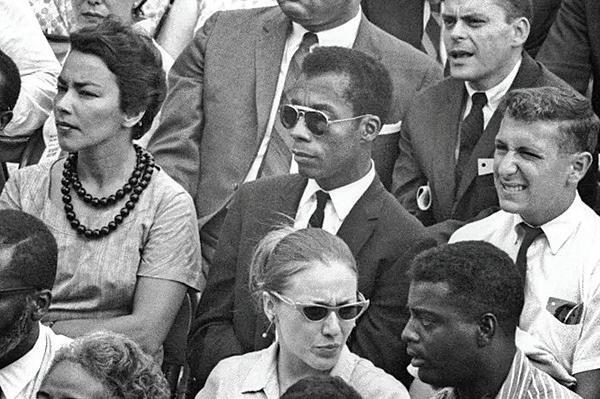
Morgan Neville delves into the life of children’s television icon Fred Rogers, and the result is 93 minutes imbued with the gentle and moving warmth that Rogers brought to his eponymous show Mister Rogers’ Neighborhood. Through archival footage of the show, interview clips from various points in Rogers’ career and from those closest to him, and even inventive animated interludes, Won’t You Be My Neighbor? paints a full picture of Rogers’ life; and in it, his integrity, tolerance, and humanism. Here is an unassuming man whose calmly resolute testimony in front of a Senate subcommittee was instrumental in saving public television. His reassuring advice to children to look for the helpers during upsetting times is still quoted to this day. It would be easy for a film like Won’t You Be My Neighbor? to end up cloying or mawkish — that it never does is what lands it on so many best-of lists. As critic A.O. Scott put it in his New York Times review, it’s an intellectually rigorous portrayal of an unwavering commitment to the value of kindness.

Patients who are uncomfortable with colonoscopy and other screening tests for colorectal cancer have a new option: a blood test called Shield. The U.S. Food and Drug Administration (FDA) approved Shield as a primary screening option for colorectal cancer earlier this week. Studies found that Shield accurately detected colorectal cancer 83 percent of the time, or in about 5 out of every 6 people.
The Shield test needs to be repeated every three years.
The FDA decision means Shield meets the performance requirements for Medicare coverage. Once coverage is established (expected in a few days), eligible Medicare Part B beneficiaries will have no out-of-pocket cost. The outof-pocket cost for Medicare Advantage beneficiaries will vary depending on their individual plans. For patients with

commercial insurance plans, the cost of the Shield test may vary depending on the individual plan coverage. Doctors can already prescribe Shield as a lab test with an out-of-pocket cost of $895. The new self-pay price for the FDAapproved version will be available when the test is launched commercially, which is expected to happen within the next week.
The blood test may help increase the number of people who are screened for colorectal cancer, says Julius M. Wilder, MD, PhD, gastroenterologist and hepatologist at Duke Health in Durham, North Carolina.
“We are far below where we should be in terms of colon cancer screening, and this blood test allows for providers to incorporate colon cancer screening into the other typical blood work done as part of the usual physician visit,” says Dr. Wilder. Colorectal cancer is the third most common cancer and the second leading cause of cancer-related death.
It’s estimated that only about 70 percent of people currently complete the appropriate screening for colorectal cancer. Experts agree that early detection

of colorectal cancer reduces the risk of death. When found at an early stage, before it has spread, colorectal cancer has a five-year relative survival rate of 91 percent. If the cancer has spread to distant parts of the body, the five-year survival rate drops to 13 percent.
How Does the Blood Test Compare to Other Options?
A colonoscopy is the most reliable way to identify polyps and colorectal cancer, with accuracy of 90 to 95 percent according to the American College of Surgeons.
But a colonoscopy requires advance prep — following a special diet, cleaning out your bowel with a combination of liquids or powder laxatives, and then undergoing the procedure itself, which requires sedatives, anesthesia or pain medicine, and procuring a ride home. If the procedure reveals nothing unusual, it only needs to be repeated every 10 years.
In addition, there are two main at-home tests for colorectal cancer:
• FIT (fecal immunochemical test) is about 79 percent accurate in detecting colon cancer. The test comes as a kit with instructions and materials to collect a small amount of fecal matter (poop) to be sent to the lab for analysis. It’s recommended that the test be repeated every one to two years.
• Cologuard (fecal DNA testing) has a 92 percent accuracy rate. It also involves collecting a poop sample and mailing it off. The test should be repeated every three years.
People should keep in mind that if the blood test is positive for colorectal cancer, they will still need to undergo a colonoscopy.
Furthermore, this blood test is for individuals undergoing average risk screening for colon cancer. Individuals considered to be at high risk for colon cancer, including individuals with a family history of colon cancer or symptoms such as blood in their stool, should undergo a colonoscopy.
And although Shield accurately detects colorectal cancer 83 percent of the time, it only identifies precancerous lesions 13 percent of the time.
Also called polyps, these can be especially apt to appear in older adults. Most are benign, or noncancerous, but sometimes polyps can change into cancer — usually over many years. One benefit of a colonoscopy is that doctors can remove precancerous polyps during the procedure.
For the many people who are hesitant to get a colonoscopy or collect a stool sample at home for testing, Shield will be a very useful addition. This blood test will make it easier for everyone to be screened, hence allowing for more people to be screened, and hopefully detect colon cancer or more advanced polyps earlier, which will significantly improve survival.





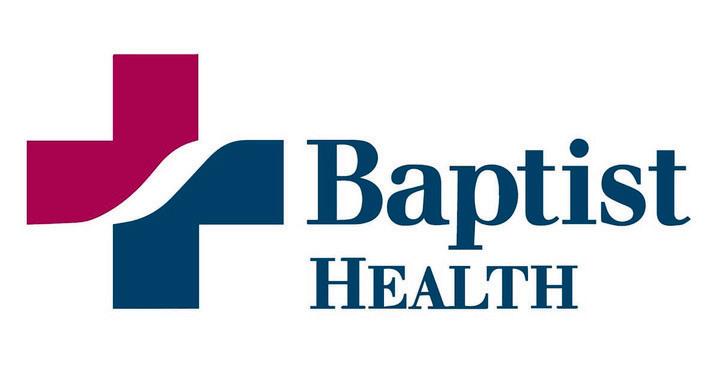





Herbie Hancock, Rosanne Cash, “MAMMA

The Gogue Center’s 2024–25 season schedule features 27 performances, including multiplenight runs of Broadway hits “Dear Evan Hansen,” “MAMMA MIA!” and “Hadestown,” jazz icon and musical innovator Herbie Hancock, country music royalty Rosanne Cash and Kathy Mattea, and the world premiere of a new work created by dance luminaries Ephrat Asherie and Michelle Dorrance. The new season also features encore performances by the Alabama Symphony Orchestra and several chart-topping a cappella groups, including crowd favorites Straight No Chaser and VOCES8.
The 2024–25 season, which is sponsored by Walt and Ginger Woltosz, is divided into six genre-specific series: Broadway, Celebrity, Chamber Music, Concert, Dance & Movement and Family.
New for this year, the Gogue Center’s Chamber Music Series performances will be excluded from its full season subscription packages. A separate subscription offering tickets to the season’s three chamber music performances will be available.
The season’s Family Series will also be offered separately from the full performance season and will include four shows tailored to younger audiences. All Family Series performances are general admission and will be offered at the reduced price of $10 per ticket.

A complete 2024–25 season schedule, including all artists and performances, dates, times and series, can be viewed here: https://aub.ie/gpac-2024-25
All performances for the upcoming season will be presented in the Woltosz Theatre.

Season subscriptions are now available to all current Gogue Center season subscribers and sponsors and will be available to the general public beginning Tuesday, June 25. Additional subscription packages as well as single tickets, will be made available on future dates.


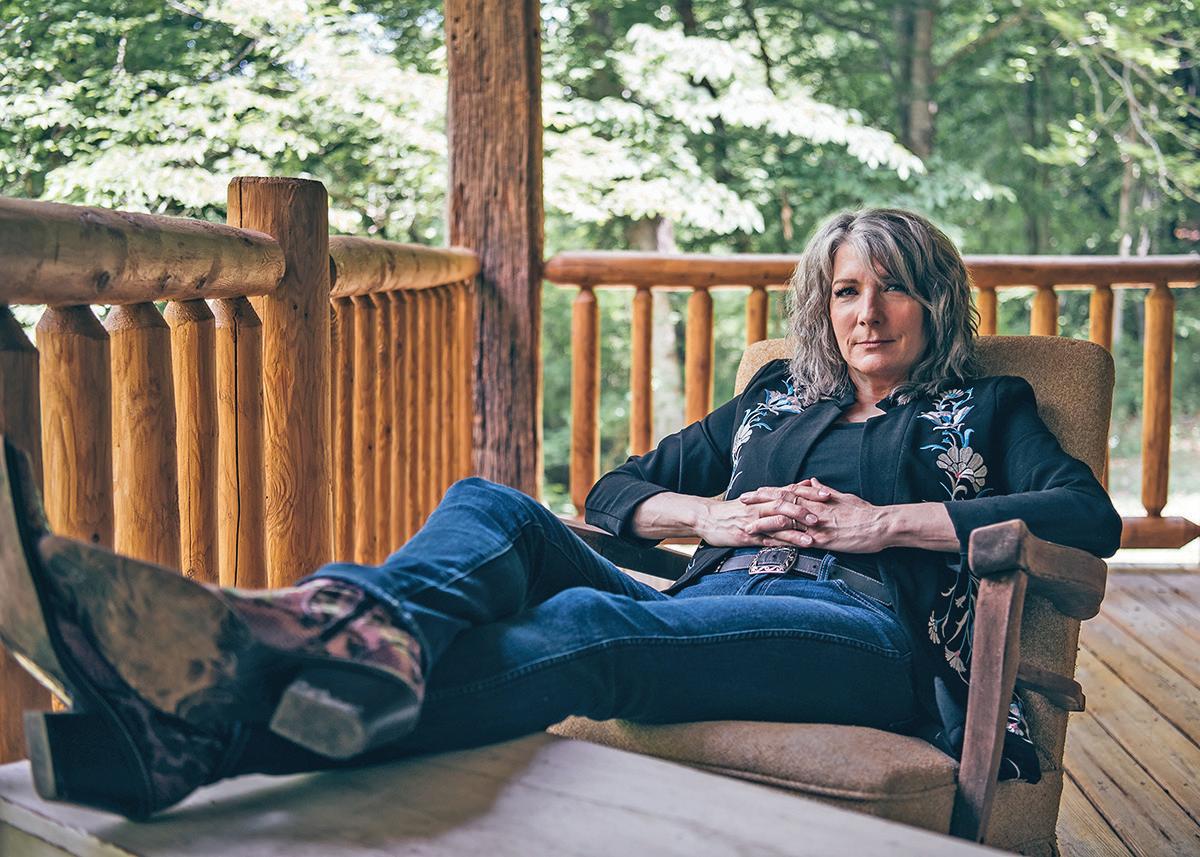
For more information on 2024–25 performances and season subscriptions, patrons are encouraged to contact the Gogue Center box office by telephone at 334.844.tixs (8497) or via email at gpactickets@auburn.edu. Subscriptions can be purchased online at goguecentertickets.auburn.edu or in person at the Gogue Center box office, located at 910 South College Street in Auburn, Alabama, Tuesday through Friday, 1–4 p.m.
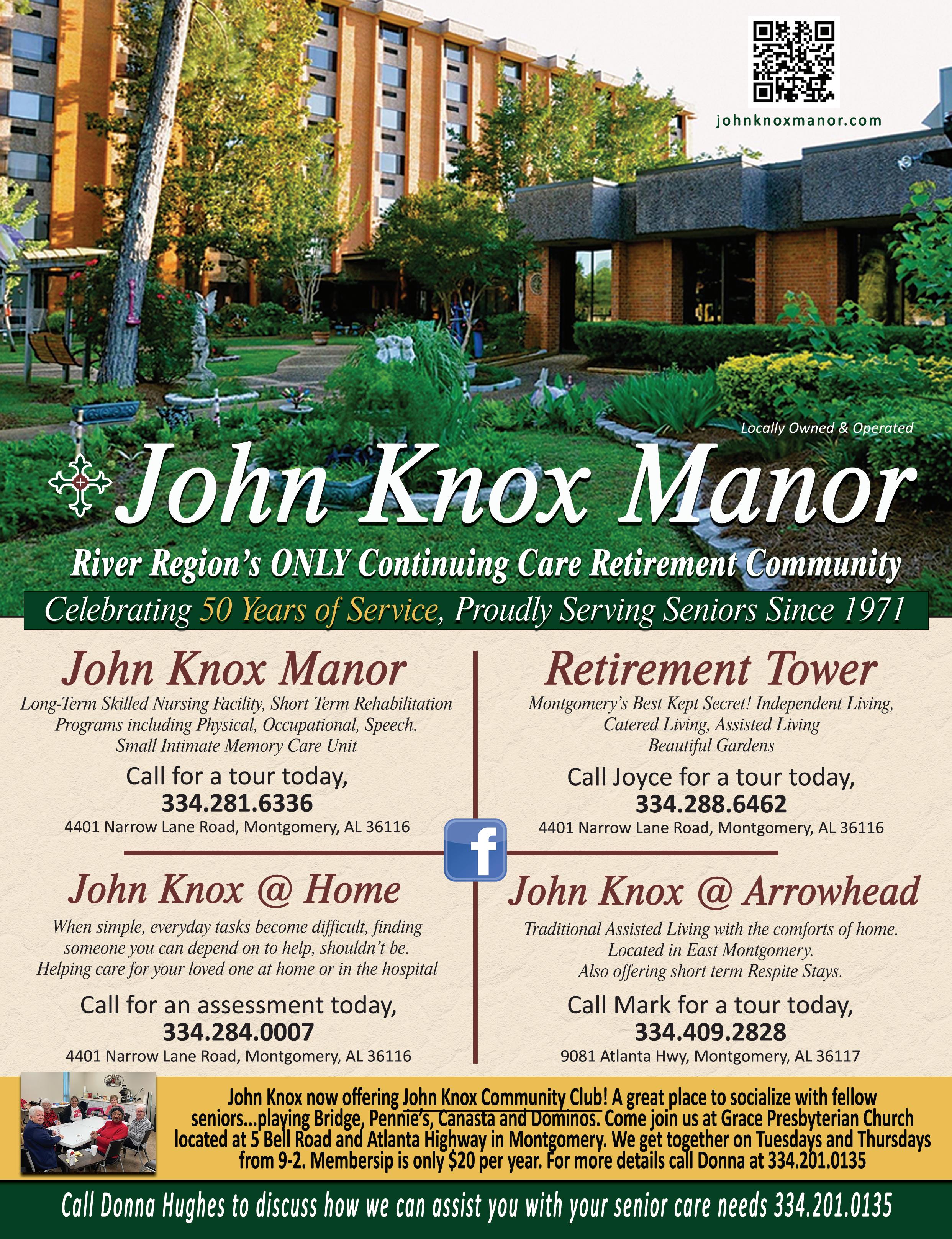
By Kate Ramsay-Scott
As Elvis and Paul Simon played on, a lifetime of memories was shared along Colorado roads
Whenever I hear the opening of Laura Branigan's song "Gloria," it instantly transports me back to my childhood of sweltering Australian summer vacations with my family. I hear her voice and feel like a kid again, stuffed in the hot backseat of the car with my brother, the drooling dog, and a mountain of luggage looming over us as we hurtle down a highway.
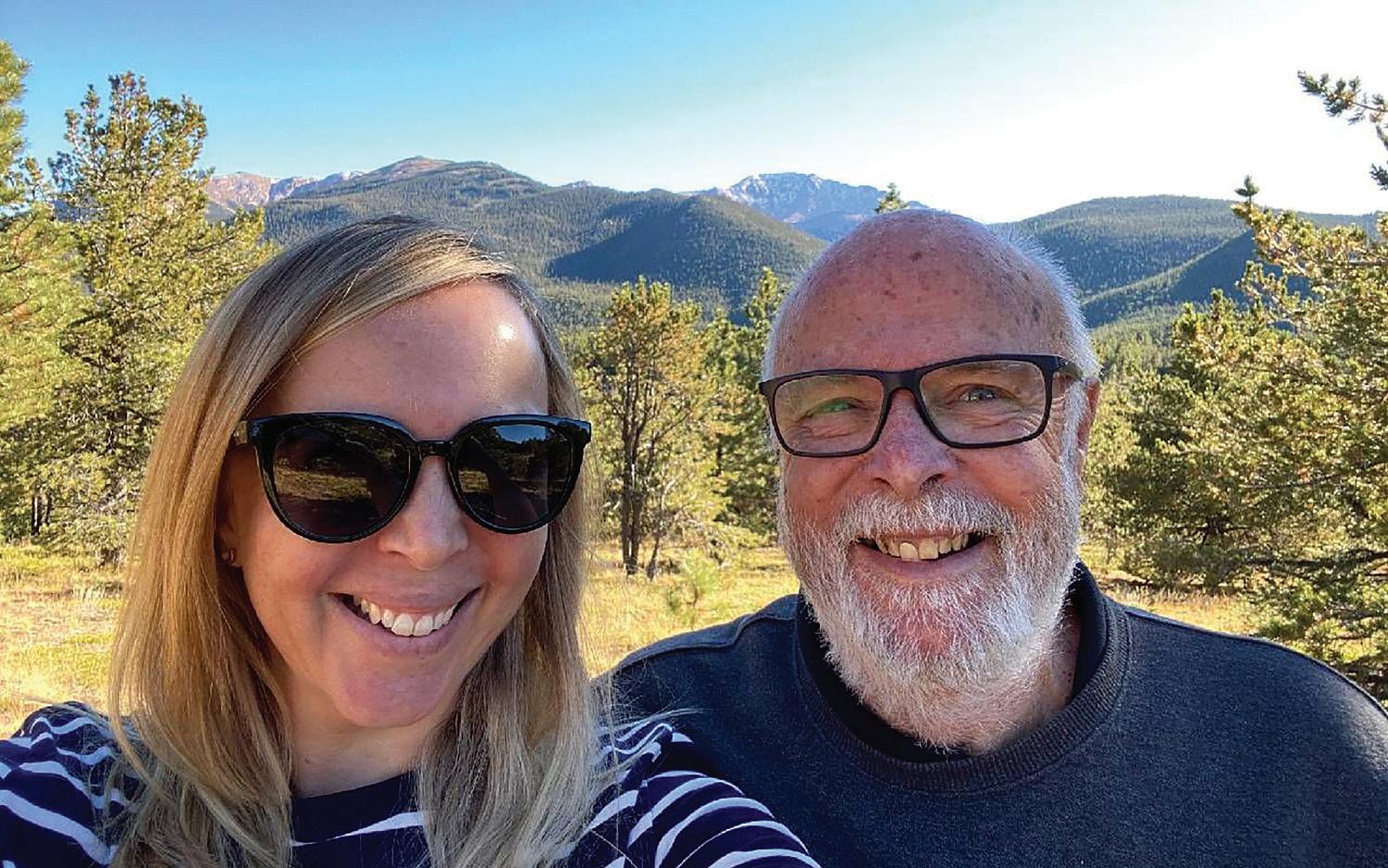
Mom and Dad, both big music fans, always had a radio or cassette player on and turned up loud. The Bee Gees, Paul Simon and Fleetwood Mac provided the soundtrack to our childhood, and I can't remember our home ever being silent. As a teenager, I lived with my dad after my parents' divorce. We spent most weekends together at our country house a few hours south of the city. On Friday afternoons, we'd pick a couple of CDs, load them into the car, and sing our way down the highway as the suburbs transformed into rolling fields and unspoiled beaches.
Dad's greatest love was (and still is) Elvis Presley, and I think I knew the lyrics to his songs before I could walk. We'd roll down the windows and sing our lungs out to songs like "Heartbreak Hotel" and "Return to Sender."
Occasionally, a song would spark a memory, and Dad would turn down the volume and tell me a story from when he was younger. He'd describe the hysterics of the girl he took to a Beatles concert in Brisbane or how, in 1976, he'd mistakenly thought he could miss the Elvis concert in Tahoe and catch him another time. (Presley died in 1977.) I loved hearing about this era Dad lived through and how he'd experienced important cultural events I'd only seen on TV or read about in books.
Last year, when he was visiting from Australia, we organized a five-day dad-and-daughter road trip through Colorado. I thought it'd be sweet to put together a playlist for the long days of driving, so I asked him to send over a list of his favorite artists to include. Our Skype chat pinged with his requests. "Elvis, The Traveling Wilburys, ABBA, Paul Simon and Joe Cocker," he wrote. Before I emailed the final list over to him to check, I slipped in a few of my
favorites and named it "The Ramsays Take CO." I was thrilled to see it contained more than 17 hours of our music.
A few months later, on a warm October morning, I met my seventy-six-year-old dad at Denver Airport. Slightly breathless from the high altitude, we hugged at baggage claim and headed out to pick up our rental car. I'd been living in New York City for eight years, and this was the first trip we'd taken, just the two of us together, since the late 1990s when we'd spent a rollicking Christmas on a small Thai island. I was excited to spend quality time with him again.
Over the next few days, our trip took us to Pikes Peak's dizzying heights and the breathtaking canyons of Gunnison National Park. We enjoyed wine tasting in Grand Junction and chilled out in the thermal pools in Glenwood Springs.
We ate at great restaurants and exclaimed, "Would you look at that!" every five minutes as we came across another stunning view. We stopped on the side of the road to take a million photos and stood together in awe at the overwhelming beauty of the redrock canyons and mesas in the Colorado National Monument. These were wonderful days spent together, creating precious memories I'll always cherish.
"Turn it up, kiddo," Dad said whenever one of his favorite songs came on. We rolled down the windows of our rental
car to let in the dry Rocky Mountain air as we happily sang along.
As The Beach Boys waxed lyrical about bikinis and the cutest California girls, I asked Dad to tell me more about his life when he was young. I don't know if it was the relaxation of being on the open road or because I was now a middle-aged woman, but he generously opened up to tell me stories I'd never heard before.
As we listened to The Rolling Stones' "Paint it, Black," he recalled his rebellion and the violent clashes he encountered with police while protesting the Vietnam War. While Paul Simon sang about his ghostly traveling companions on the way to Graceland, Dad talked about his brief first marriage to a woman I'd never met.
He spoke about 1960s surfing culture, the shockwaves of the sexual revolution, and the complexities of his relationships with his strict but loving parents. As we drove over a high snow-coveredmountain pass, The Traveling Wilburys crooned "Handle with Care" while Dad
reminisced about his lifelong friend Bruce, who'd recently passed away from cancer. We talked for a long time about when they were young, growing up together in Brisbane, and how much we all missed him.
It was more of a conversation between friends than between a father and daughter. No topic seemed to be offlimits or too prying, and I loved hearing what shaped the man I appreciate and treasure today. Being welcomed to delve into his past was a gift, and I value how special it was to uncover a whole other side to his life beyond his role as my dad.
On the last day of the trip, we drove back to Denver Airport along the interstate. I was sad our vacation and my time with Dad was coming to an end. It'd been so nice to slip back into the easy rhythm we'd always had, and it reminded me of all the fantastic fun we'd had together over the years.
As I skipped through a few songs on our playlist, looking for something upbeat,
Elvis's "Suspicious Minds" began to play. I cranked up the volume, and we both belted out the lyrics.
I looked across at Dad and laughed when I saw how we harmonized together. We'd always been very close, but I realized something else had bloomed while we drove, sang, and shared our way through Colorado. We didn't need to climb mountains or do anything crazy; the highlight of the trip was being together amongst the beautiful scenery and connecting in a more profound and grown-up way.
All we needed was each other's company, an open road, and the old memories woven through the songs on a 17-hour playlist.
Kate Ramsay-Scott is an Australian writer who loves eavesdropping on the subway and lurking amongst the shelves of a good bookstore. She’s completing a Master of Creative Writing and lives in NYC with her husband and their cheese-obsessed dachshund. Reach her at kateramsayscott.com
source: www.nextavenue.org

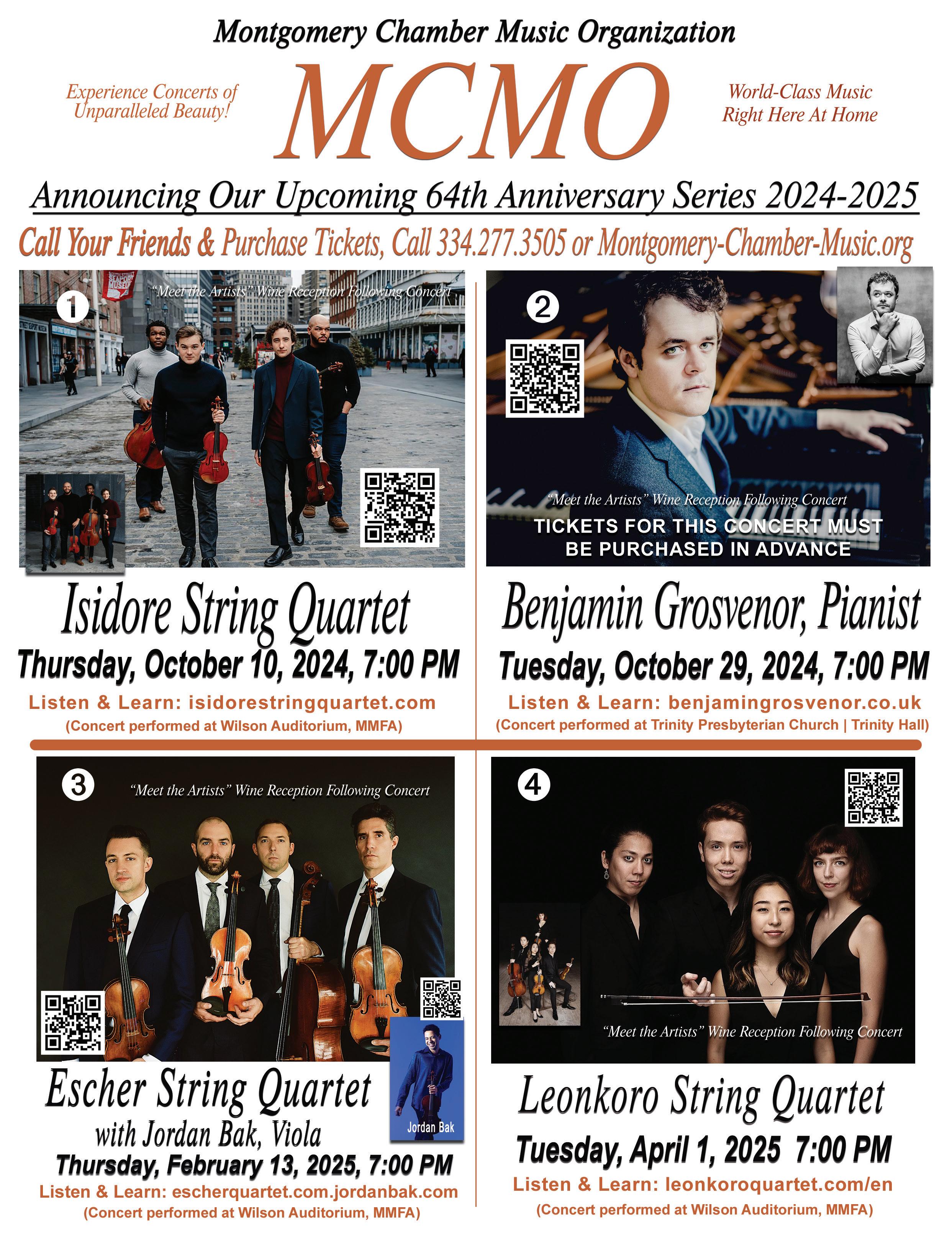
Get ready for the tastiest event of the year as the 12th Annual Pike Road Crawfish Boil makes its highly anticipated return on Saturday, May 18, 2024!
Hosted at Century Church from 10 AM to 6 PM, Century Church is located at 1001 Marler Road Pike Road, AL 36064. This favorite community event promises a day filled with great food, live music, and lots of fun, all in support of a great cause.
The Pike Road Crawfish Boil brings the community together for what we all believe in – PIKE ROAD SCHOOLS! Proceeds from the event directly benefit the Pike Road Patriot Fund, which benefits arts and athletics for Pike Road Schools. We are excited to share that over the past decade, the Pike Road Patriot Fund has donated $190,343 to arts and athletics for
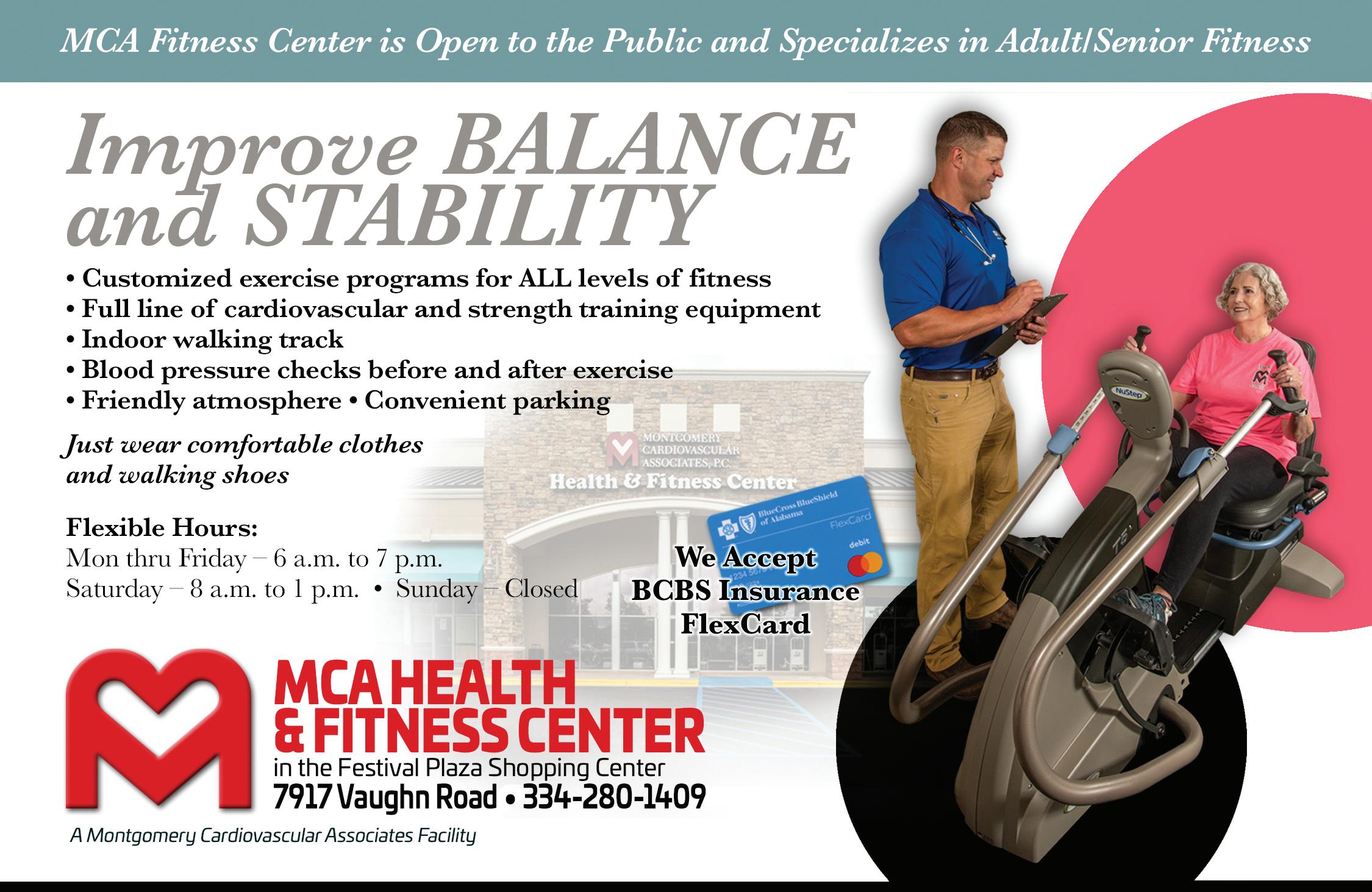

By Chris Wheatley
By 1964, The Beach Boys were three years and five albums into a career that had seen the Wilson brothers — Brian, Dennis and Carl — plus their cousin Mike Love and friend Al Jardine go from local stars to national hit-makers with a remarkable string of top ten records.
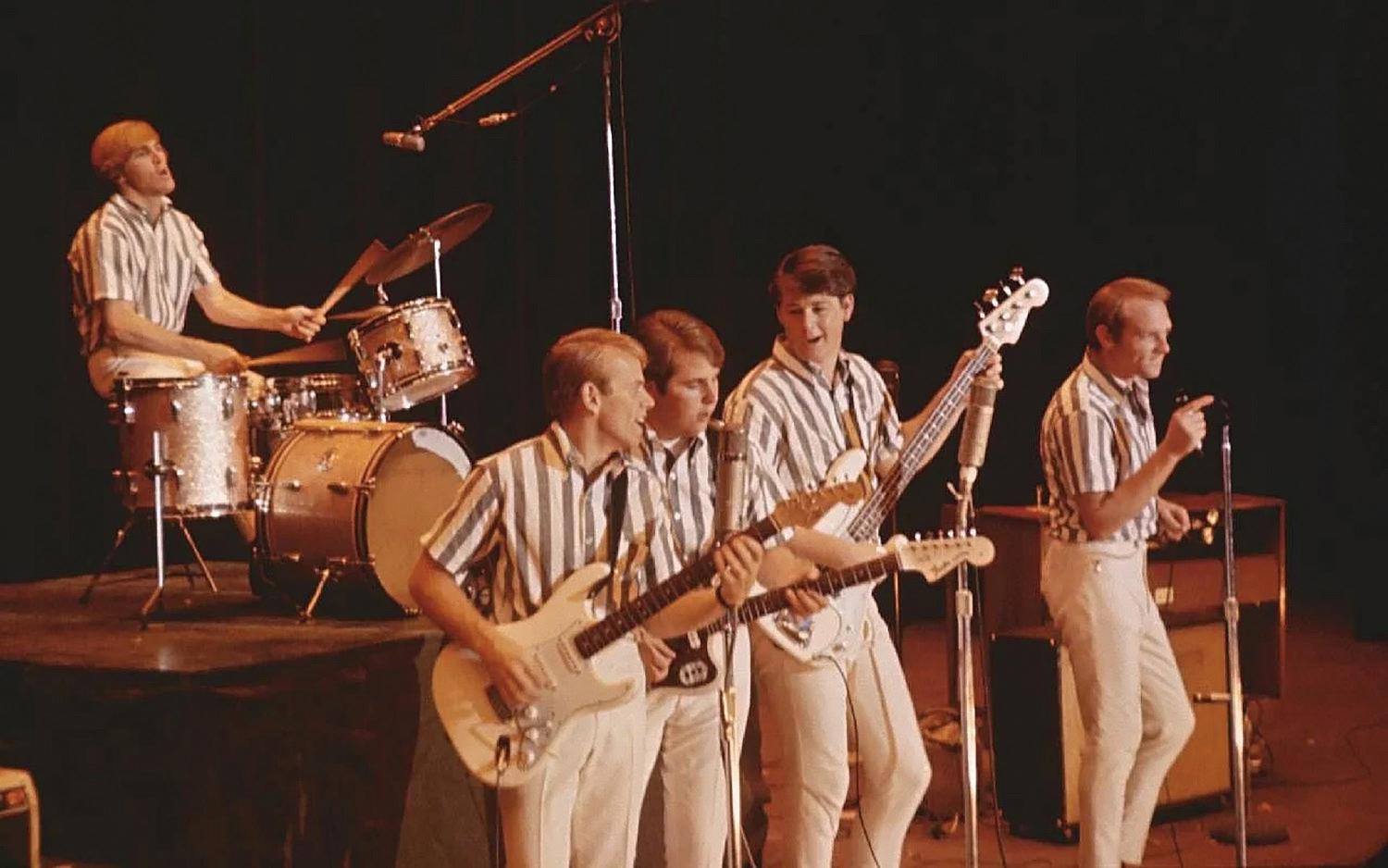
Their music celebrated a semi-mythical California of endless summers, souped-up automobiles, surf culture and young love. From the start, they were unlike any other band, eschewing the predictable reverb-drenched instrumentals which had become a defining feature of the California Sound, in favor of striking harmonies, sophisticated compositions and addictive hooks.
One Hit vs. Three
Turned down by both Liberty and Dot records, The Beach Boys' first album, "Surfin' Safari" (1962), chiefly consisted of original recordings, most of them written by Brian Wilson, but they had to wait for their second album, 1963's "Surfin' U.S.A.," to ring up their first significant hit, with the title track reaching number three on the Billboard weekly Hot 100 chart. Over the next few months, the band scored seven more charting singles, three of which broke into the top ten. Although they had yet to achieve a number one, The Beach Boys were riding high.
Then four lads from Liverpool threw a monkey wrench into the works. On February 9, 1964, The Beatles appeared on The Ed Sullivan Show and the impact in the U.S. was seismic. British bands were suddenly all the rage and acts from across the pond stormed the American record charts.
Released that same month, The Beach Boys' "Fun, Fun, Fun," a Brian Wilson and Mike Love original, had been rising in sales, only to stall at number five, behind The Four Seasons' "Dawn, Go Away," and no less than three Beatles' songs, with the Fab Four's "I Want to Hold Your Hand" and "She Loves You," exchanging places at the top ("Please, Please Me" being the third).
Through the remainder of the year, Beatles' songs sat at number one for a total of 18 weeks, with fellow British artists The Animals, Manfred Mann and Peter and Gordon taking their turns at the top.
There's no doubt that Brian Wilson & Co. saw The Beatles as a challenge. Speaking in a recent radio interview, Wilson explained: " 'I Want to Hold Your Hand' really blew my mind. I knew we were good, but it wasn't until The Beatles arrived that I knew we had to get going. The Beatles invasion shook me up a lot. They eclipsed a lot of what we'd worked for."
It didn't help that The Beatles and The Beach Boys both held contracts with Capitol Records. A competition for marketing and other resources seemed inevitable and set the scene for one of the most famous, albeit it respectful, rivalries in popular music history.
Determined to catch up, The Beach Boys returned to the studio to work on a new album, "All Summer Long" and a new single, "I Get Around." Co-written by Wilson and Mike Love, "I Get Around" marked a turn toward a more ambitious style, with an unusual chord structure and slower a cappella passage. Love sang the bass notes, complimented by Wilson's falsetto, with Carl, Dennis and Al contributing backing.
As Love later recalled: "Brian is amazingly adept at chord progressions and coming up with harmonies and so on. I was pretty quick on the lyrical side, and the hooks. So, we were just a very good partnership at that time."
With Wilson producing, a small cadre of crack session musicians were drafted in to augment the group: Hal Blaine on drums, Ray Pohlman on bass guitar and future solo star Glen Campbell also on bass. Together with other select musicians, these three were part of a loose confederacy unofficially known as The Wrecking Crew, and you can hear them on countless hits of the 1960s.
In those days, songwriters and publishers would often cut demos of songs so that artists could listen to a new composition and decide if they would like to record it. This is where The Wrecking Crew started out.
I had the pleasure of talking to Blaine several years ago before he died at aged 90 in 2019. As he explained to me at the time: "We demo guys were doing such good work that companies started to hire us to do masters with their artists. The word spread fast. The older guys though that we were kids who would be wrecking the music — quite the opposite! I started calling us the Wrecking Crew and the name caught on."
Blaine alone played on hundreds of records, and various members of the Crew can be heard on The Righteous Brothers' "You've Lost That Lovin' Feeling," "Mr. Tambourine Man" by The Byrds, "California Dreamin'" by The Mamas & the Papas, and "River Deep, Mountain High," by Ike and Tina Turner, among many more.
In 2022 I spoke to another legendary Wrecking Crew alumna, bass guitarist Carol Kaye. While she didn't play on "I Get Around," Kaye contributed to many Beach Boys recordings, including "Good Vibrations" and most of The Beach Boys' classic album, "Pet Sounds."
When I asked her why those tracks from the 1960s still stand out, she underlined the special nature of the session players. "We got our experience by going on the

road with big bands, getting great with technique and time," she said. "There's no place to really get that experience these days. Later, they just couldn't do it like we did. We played the best we ever could on those recording dates."
"I Get Around" was recorded over two days in April at Western Studios in Hollywood. In his autobiography, "Good Vibrations," Love explained the lyrics: "I tinkered with Brian's first verse, which was about this bored kid driving around but was really about our own experiences: how we had this instant fame, some fortune, had travelled all over the country, but did any of that bring us happiness? Maybe we needed to find a different kind of place."
The track was released as a single on May 11, 1964, gripping listeners with its opening swirling harmonies and the nowfamous first verse: "I'm gettin' bugged driving up and down the same old strip." On July 4, 'I Get Around' reached number one on the U.S. Billboard chart, a long coveted first for The Beach Boys. The
single also broke the U.K. top 10, another first for the band, where it peaked at number seven and remained in the top 100 for a total of 13 weeks. September brought yet another breakthrough — The Beach Boys' debut appearance on The Ed Sullivan Show, where they played "I Get Around" live to an appreciative audience.
The band would arguably reach its creative peak two years later with the album "Pet Sounds," a record whose reputation only increases with time. Coming full circle, "Pet Sounds" inspired and spurred four lads from Liverpool to produce their own masterpiece. "That was the album that flipped me," Paul McCartney recalled in an interview with Keith Bradnam for the 2000 biography "The Beatles: Off the Record."
"The musical invention on that album was, like, 'Wow!' " McCartney said. "That was the big thing for me. I just thought, 'Oh dear me. This is the album of all time. What the hell are we going to do?'" The answer came in 1967 in the form of "Sgt. Pepper's Lonely Hearts Club Band," a wildly inventive concept album that lifted The Beatles to new artistic heights.
Wilson and McCartney met several times over the years, offering each other encouragement, support and praise. Two wonderful songwriters without whom the history of popular music would be very much the poorer.
Chris Wheatley is an author and music journalist in Oxford, England. He has written for London Jazz News, Longreads, Loudwire, Record Collector, Songlines and other websites and publications. He will tell you he has too many records, too many guitars and not enough cats.
Source: www.nextavenue.org
By Mark S. Walton
Only 44% of the people who stop working ever consider themselves to be happy in retirement, a comprehensive study has found
About 15 years ago, two widely respected research psychologists conducted what is considered the most sophisticated and comprehensive study ever done on the topic of retiring from work.
Interviewing nearly 1,500 retirees from all walks of life, they posed a series of meticulously crafted inquiries designed to elicit candid, extended responses to a central underlying question: Now that you're no longer working, how are things going for you?

in addition to his corporate consulting and teaching activities, was Associate Provost of Touro College in New York and was considering his future as well.
Additionally, they interviewed 400 people of the same age and demographic characteristics who were still actively involved in their careers. The goal here was to understand this second group's expectations about retiring from work and compare them to the realities of retirement through a statistical method called regression analysis.
Along with their professional interests in all of this, the psychologists, Dr. Rob Pascale and Dr. Lou Primavera, each had a personal agenda at stake.
Pascale, in his mid-50s at the time of the study, had recently stepped down as president of the powerhouse market research firm he had founded, Marketing Analysts Inc., and was in search of the secrets of a long, happy retirement.
What Is a Good Retirement, Anyway? Primavera, who was approaching age 70,
Once the in-depth interviews were completed, and the responses crosschecked and analyzed, Pascale and Primavera's results scientifically reaffirmed the findings of numerous smaller anecdotal studies, namely:
Full stop retirement is not right for everybody — in fact, for a solid majority of people, it can turn out to be a seriously bad idea.
Most retirees are reluctant to talk about this, Pascale told me, for fear of sounding naïve, argumentative or personally flawed. But because the study guaranteed anonymity to its research participants, they felt comfortable telling it like it is.
Consequences to Consider
"We found that most people are not aware of the conditions you're going
to face when you stop working," Pascale said.
"You're not aware that you're losing your friends, that what kind of job you had mattered. There are so many aspects to what happens in your life that there's no way you could ever know without personally being retired."
I ran across Pascale and Primavera's study and reached out to them while working on my most recent book, "UNRETIRED: How Highly Effective People Live Happily Ever After." One thing I especially wanted to know was: based on the data from their study, would it be feasible to reasonably estimate the odds that you, or I or any one of us, would personally flunk retirement?
"Over time," Pascale told me, "our research showed that only 44% of people ever consider themselves to be happy after they stop working. One of the things we have when we retire is expectations that life will be this or that, but our expectations are driven by what we did in our lives, in our careers and how interesting or fulfilling and satisfying our careers were."
He continued: "Now that's all gone and the idea that you can replace those things with personal interests, hobbies or making new friends, proves to be false. In fact, that's the way it was for me."
Yes, you read that correctly, and it's an important part of the story of Rob
Pascale and Lou Primavera.
As mentioned earlier, Pascale was in his mid-50s when the study was done, and part of his motivation was to learn how to deal with the personal hopelessness he started to feel soon after his retirement.
Instead, the study results served to confirm his greatest fear: that even though he could easily afford it, taking early retirement was one of the biggest mistakes he ever made.
"I definitely should have stayed at work at least a few more years," Pascale explained. "I could have found an alternate way to reduce the pressure, like working fewer hours or hiring more people. There were alternatives that I could have done that probably would have worked out better. I wish I'd known back then what I know now."
What are the character traits of people who would be happier if they continued to work into their 60s or beyond, full or part time, in their original career or a new one, even if, like Pascale, they could afford to call it quits?
While interviewing dozens of happily unretired people for my book, I found that a combination of several, or all, of the following words best describes them: highly effective, accomplished, creative, competitive, curious, easily bored, goal oriented and altruistic.
Practically all of these descriptions applied to Pascale, who miserably flunked retirement, and they similarly characterized Primavera, his fellow researcher who, at age 80, still vehemently refused to call it quits.
In addition to his college administrative position, Primavera had continued teaching in the classroom and relished every minute of his working days.
"I teach data analysis and research design," he told me. "I teach people how to do research studies, the kind of stuff you read about in the newspaper all the time. And I teach them how to do statistical analysis to understand the results."
Primavera credited the retirement study that he and Pascale had completed a decade earlier, for hardening his resolve to continue working as long as possible. Reviewing the results of their research, he said, had generated a moment of absolute clarity.
"There's always that initial elation, you know, when people retire," Primavera explained. "You're really happy at first, then, all of a sudden, and there's a very predictable cycle, you start to go down, down, down. And either you find a way up again or, if not, you're stuck at the bottom."
"Seeing this in black and white, I thought to myself: 'I like doing what I'm doing, so I'm gonna keep doing it.' Do I need the money? No, but it's challenging me, it's having me learn new stuff. It makes me weary sometimes, upset sometimes, but would I give it up? Absolutely not."
And what, I asked him, would be his prescription, as a highly trained psychologist, for those of us who have reached or been pushed into retirement, and found ourselves bored, stifled and unhappy? Or for people who fear that, once retired, they might feel that way?
"Select activities that maximize your strengths," he recommended. "Analyze your skills going back to your original job or career. Where do they fit? Where will you feel good about what you're doing?"
Embrace Experimentation
"You've got to be willing to experiment, try out different kinds of work until you find something that's right for you. And then decide how to go about making it a part of your life."
If Primavera's advice resonates with you
personally, you're far from alone. Based on government data, there are millions of Americans aged 65 or over with bachelor's or advanced degrees who are currently working — not because they need the money, but because they, like Primavera, crave the sense of meaning and purpose that a fulfilling job or entrepreneurship can provide.
Between now and the year 2030, their numbers are projected to grow by another 40%, as the seismic unretirement trend continues to change the map of life.
Mark S. Walton is chairman of the Center for Leadership Communication, an education and communication enterprise with a focus on leadership and exceptional achievement at every stage of life. He is a leadership educator, management adviser, and award-winning journalist (CNN's first chief White House correspondent) whose work has spanned nearly four decades. His most recent book is "UNRETIRED: How Highly Effective People Live Happily Ever After."
source: www.nextavenue.org

Whether our grandchildren are digging into ice cream sundaes or swiping the screens on their iPads, the effect is the same. A neurotransmitter called dopamine is released in their brain. This chemical travels via neural pathways to the brain’s reward center, thereby providing a feeling of pleasure.
What’s the problem? After all, who doesn’t love to bake a batch of chocolate-chip cookies or go out for ice cream with their grandchildren? What long distance grandparents don’t use video chatting as a way to connect, build, and maintain loving and trusting relationships with their children and grandchildren?

The purpose of this article isn’t to condemn an occasional ice cream cone, movie or video game. The purpose is to examine the effects of dopamine on developing brains and discuss healthy and effective ways to navigate the amount of screen time our grandchildren watch while they are in our care.
Negative Effects of Digital Screens: According to the US Department of Health and Human Services, the average American child spends seven hours per day staring at a digital screen.1 This means that for children who sleep ten hours per night, fifty percent of their waking hours are spent interacting with digital devices.
These videos and games have been deliberately designed to deliver intermittent rewards that trigger the release of dopamine. As we have already seen, dopamine provides a feeling of pleasure and leaves our grandchildren, or anyone for that matter, craving more. Unlike I Love Lucy or The Andy Griffith Show, which we watched as children, videos and games don’t end after thirty
minutes; they stream continuously. Evidence is beginning to show that dopamine, triggered by digital screens, impairs impulse control and entraps children in a perpetual state of hyperactivity. This hyperactive state negatively affects their social interactions, school performance, and overall behavior. When the reward centers are overstimulated, other areas of their developing brains are not as active as they should be. As a result, children who spend too much time watching television and playing video games have trouble focusing, retaining information, communicating and controlling their emotions. Basically, they become mentally lazy.
Given that digital screens appeal to the reward center of our brains, psychologists recommend that parents and grandparents do NOT use screen time as a reward in itself.
Research also shows that some children prefer the virtual world to reality. Their desire for constant stimulation, which video gaming and other video sources provide, becomes all encompassing. Because boys are visual and highly competitive, they are more susceptible to becoming addicted to gaming than girls.
Digital screens are here to stay. So, what are we as grandparents— especially those of us who babysit regularly—expected to do?
Establishing and Maintaining Healthy Screen Time Boundaries: We start by understanding and respecting the guidelines for screen time and social media set by our grandchildren’s parents. Many of our adult children have already programmed parental controls on their devices. These controls monitor both time and content. If we don’t know the guidelines, we need to ask. If we don’t agree with the guidelines, we need to request permission to discuss our concerns, all the while being respectful and remembering that we are grandparents, not parents.
Next, we need to establish guidelines for our own homes. While our rules may be stricter than the ones our adult children have established, they should NOT be more lenient.
We need to prayerfully determine the following:
1. Which digital devices are welcome in our home? Televisions, iPhones, iPads, personal computers, and gaming consoles such as PlayStation and Xbox are all digital devices.
2. How much screen time do we allow per day?
3. Does our home have any sacred spaces that are off-limits to devices?
For example, are iPhones prohibited at the dining room table while we are enjoying Sunday dinner? Are gaming consoles and iPads prohibited from the bedrooms or behind closed doors?
4. What media content is allowed in our home?
Digital devices afford anyone easy access to mature content (violence,
sex, gambling and strong language). Consequently, we need to monitor what our grandchildren are watching while they are in our care. The nonprofit Common Sense Media provides ageappropriate rating guides for movies, television shows, podcasts, apps and video games so parents and grandparents can make informed decisions.2
Our screen time guidelines need to be communicated with our grandchildren and their parents in a friendly atmosphere and not as a result of an argument
Children and teens will automatically turn to digital devices when they become bored. Therefore, we need to be intentional about planning family-oriented activities when our grandchildren are visiting or in our care. Fun activities include the following: hiking trails at a county park, visiting the zoo, having a Lego-building contest, combing the beach for shells, building a castle with cardboard moving boxes, taking an art lesson, touring a museum, having dinner at a Mexican restaurant, washing the car, or checking out books at the local library.
Modeling healthy smartphone and screen time habits:
If we want to help our grandchildren develop healthy smartphone and screen time habits, we need to model them. We start by taking an honest inventory and regulating the amount of time we spend looking at our iPhones and computers, especially but not limited to the times we are with our grandchildren. Furthermore, we need to police ourselves when it comes to posting photographs and information about our grandchildren on Facebook, Twitter, Instagram and other types of social media platforms.
Readers were outraged when founder and CEO of Facebook and MetaPlatforms, Mark Zuckerberg, posted a family photo and message on Instagram on July 4, 2023. He obscured his daughters’ faces with emojis. What does this show us? Regardless of the so-called safety nets, we need to take precautions when “sharenting” or posting our grandchildren’s pictures on the internet.

Social media is ubiquitous. It’s practically impossible to retrieve a photo or personal information after it has been shared.
Closing Thoughts:
Watching grandchildren can be exhausting, especially for those of us who are in our sixties and seventies. Screen time keeps our grandchildren occupied while we get some needed rest. However, given the fact that excessive
screen time produces a continual release of dopamine, conditioning our grandchildren’s brains to seek pleasure, it’s imperative we set limits and monitor screen time while they are in our care.
2 Common Sense Media: Age-Based Media Reviews for Families | Common Sense Media
Recommended Resources: Grandparenting: Screen Kids, Gary Chapman and Arlene Pellicane (Chicago: Northfield Publishing, 2020).
Source www.christiangrandparenting.com
by
I learned exceedingly early about gardening when I was a little girl growing up in Birmingham; my grandmother always had a vegetable garden. It was essential to feed a family of eleven children, half of whom were boys and could eat their weight in food! I was only 3 or 4 years old, but she would ask me to come help pick the “okrey” and I was always happy to do so even though I would get so itchy because the okra plants grew about six feet tall and a little girl walking through them picking okra could not help but get itchy! However, I knew that after helping her, I would get to do two things: one was to play in the sprinkler when she turned it on to water the garden and the other was to tend my own little garden patch that she helped me plant. I remember the flower was called Hollyhocks and it was the thrill of my life after planting them seeing them sprout, grow, and flower into all assorted colors.

Okra was not one of my favorites growing up because my mother used to get a kick out of watching me gag trying to eat the boiled, slimy pods. I now love okra if it is fried or cooked in soup or perhaps some peas, but never boiled!
I was surprised to find out that okra is related to cotton and hibiscus plants, but in looking at the flowers and pods I really should not have been. It was always interesting to me how the okra pod grows behind the flower, rather than in the middle of it like other vegetables grow. Okra is one of the easiest to grow and is healthy, up to the first frost. The temperatures must be warm; at least 70 degrees in the evening and the soil a PH of 6.5-7.00, which is what our area is. However, it would not hurt to turn

in mature compost to enrich our native soil. This guarantees a great crop if it is harvested when it is 4-6 inches long. Any bigger than that and it is too hard and tough to eat!
Its origin is from West Africa, Ethiopia, and South Asia but I would have sworn it originated in Louisiana since gumbo is their specialty. It came to the Americas centuries ago with the Atlantic Slave Trade. It grows best in hot and humid climates and that certainly includes Alabama. I was also surprised to find out that botanically it is a fruit, as it is the seed-bearing part of the plant.
Regardless of how you enjoy it, there is no denying okra is a versatile vegetable that is remarkably high in nutritional value, and I look forward to growing it in my garden soon.

Linda Hicks, an intern in the 2023 Master Gardener Class, lives in Millbrook. For more information on becoming a master gardener, visit www.capcitymag.org or email capcitymag@gmail.com
AUM OLLI offers courses in the four terms of the calendar year (fall – eight weeks, winter and spring terms – seven weeks, and a summer mini-term – the four weeks of June). The courses fall into three categories: study/discussion, active, and hands-on (crafts and do-it-yourself). The staff tries to have both new courses and returning courses whenever possible. The 2024 Fall Term has just such a schedule.
There are two new courses in the study/ discussion category: espionage since 1945 and a history and study of Faberge’ eggs. Returning courses in this category are electronic fraud, theatre appreciation (with a new selection of plays), and the history of freedom.
Art Connects, which meets at the Montgomery Museum of Fine Arts, is a mixture of new and returning material. It will continue the approach of studying the exhibitions that are currently on display at the Museum and add a do-it-yourself segment of making art. The participants
will create their own works of art that will be displayed in the Museum at the end of the term with a celebratory reception.
Brain Bowl is a mixture of the study and active categories. The “exercise” of the brain to answer questions often leads to some lively discussions about the answers.
The active courses are returning courses: Tai Chi (two categories), line dancing, and pickleball, which meets at the AUM Wellness Center. These courses allow AUM OLLI members to keep physically active while they are also exercising their minds.
The hands-on category has a variety of new courses. In addition to creating works of art at the Museum as part of Art Connects, OLLI members can create ceramic pumpkins in a pottery class, also at the Museum. They can make pillows or wreaths or glass angels, learn oil painting techniques, and expand their skills of painting with dots. These all offer opportunities to create unique holiday
gifts. This category includes making jewelry or pop-up cards, or they can write and print memoirs for special gifts. They can also improve the playing of bridge or Mah Jongg. The schedule will include a special Game Time, when the game room (furnished with card tables and chairs) may be used for groups of registered members to gather and play games of their choosing.
The 2024 AUM OLLI catalog for Fall Term will be released and posted online at www.aum.edu/olli by early August. It will include a detailed schedule of days and times for courses as well as field trips and lunch presentations. Join AUM OLLI in the 2024 Fall Term to exercise your mind and your body as well as learn some skills that might lead to unique holiday gift-sharing.


Photography provided by Jeff Barganier
It never ceases to amaze me how our beautiful State of Alabama is so rich in history. Cindy and I recently visited Old Cahawba Archaeological Park west of Selma and were mesmerized by what we discovered. We talked for years about visiting this site of Alabama’s first capital before finally making the 1 ½ hour drive. It’s worth an afternoon— preferably on a cool autumn day— to step into the past and immerse yourself in the lives and fortunes of some of Alabama’s earliest and most interesting citizens.

Assistant Site Director Jonathan Matthews shared his insights with us at the Visitor Center. He pointed to a map, saying, “So, you see miles of road. The roads in dark brown are navigable. I’d say ninety percent of people just drive everywhere. The more adventurous walk. We even have a free bicycle program that’s included in your admission ($2.00) on a first come first serve basis. Jeff Feet over in Montgomery at Capitol City Bicycle and Service on Goldthwaite Street provides the bikes. The four to five miles of roads are laid out in the old-fashioned grid. The Explorer’s Guide to Old Cahawba lays out some 22 sites of former structures—a few still standing. For example, if you go to number 10, you see the towering columns of the Crocheron Mansion (1843) while at number 20, you see one of Cahawba’s grand overflowing wells that was located outside the back door
the roads in brown are navigable, the roads in beige have been reclaimed by Mother Nature. But

of the Perine Mansion (1857). At number 17, you would be at the site of the oneroom school house that dates back to the 1930’s. So, while
people here centuries before and after. What makes Cahawba unique is that it was a pre-planned community, much like Washington D.C. was planned. Then Governor Bibb scouted out potential town sites and he selected this site for our first state capital. What it had going for it, obviously, was two rivers for navigation and the federal government offering 1000 acres. Kind of a no-brainer. Free land. Two navigable rivers.

these are on the map so you have a sense of scale of how big a city it was. This map is a snapshot of time between 1819 and 1826. In reality, there were
Months before Alabama’s statehood in December 1819, newspapers heralded the coming capital city. And lots were selling for $5000!
Today, everyone thinks of Cahawba as a ghost town. But it was a ghost town long before they ever started building the capital. When Cahawba was carved out of the wilderness of the new State of Alabama, it was built upon the ruins of a 16th Century Mississippian Indian village thought to have connections to other Alabama indigenous people like the mound builders at Moundville near Tuscaloosa. It has been alleged, but not proven, that Alabama’s Chief Tuscaloosa and ten thousand braves may have fought Hernando DeSoto as he explored the Southeast in this area. “The archeologists are still arguing about this,” Jonathan said.
Governor Bibb died before his dream came true. The state’s capital was moved to Tuscaloosa in 1826 due, in

large part, to “flood fears” spread by competing developers in Montgomery and Tuscaloosa. But that was not the end of Cahawba. It was still the county seat of Dallas County. The county courthouse was here. Being the seat of local government served to anchor Cahawba until the early 1850’s when the Greensboro/Marion to Cahawba Railroad was created, re-energizing the city. That’s when Cahawba really took off.
“History has formed a landscape. That’s the great thing about Cahawba,” Jonathan said. The man-made mound of soil for the rails can still be seen. To celebrate the new incarnation of the city, they dropped the W and changed its name to Cahaba. The railroad brought increased population, goods and services, and businesses. And this was the apex of Cahawba’s history. “During the years before the Civil War, the town had ‘high technology’ artesian wells—some two dozen around town—comparable to us getting 5G telephone service,” Jonathan explained. Cahawba had two brick yards, a sash and blind factory that also


made doors, mantlepieces, bedsteads, and other wood products necessary to finish a house. The city also had a distillery. It began getting stately manors, commercial buildings, shops and galleries when wealthy merchants moved here from New York and built impressive business structures.

While history is a glorious story of human achievement, it’s also an account of man’s cruel
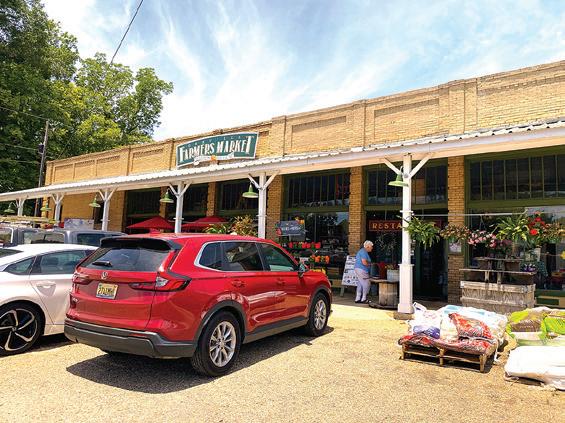
follies. During the Civil War, Cahawba’s Bell Tavern became a hospital for Confederate and Union soldiers alike. But its largest warehouse was converted into a prison for Union POW’s. At war’s end, when these Union men were paroled to return home, thousands of them died aboard

the steamboat Sultana when it exploded near Memphis.
Cahawba has many black heritage sites. The postbellum population was about 80% black during reconstruction. Black schools were established, and the abandoned courthouse became a regional center for freedmen seeking political power. Cahawba became known as the “Mecca of the Radical Republican Party” as the freed slaves fought Democrat Party voter suppression.
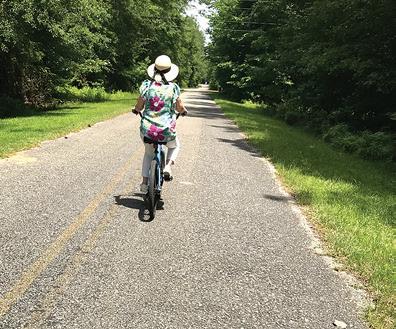
I love places like Old Cahawba—so much to learn, do and see here. I would love to have lived here had I been born a hundred years earlier. But, alas, I can still visit the park and soak up history. It’s open seven days a week, 9:00-5:00. The Visitor Center is open Thursday through Monday, 10:00-4:30. There’s a self-service kiosk outside for anyone who comes on a day the center isn’t open. By the way, “Orrville Farmers Market” (334-996-8301) is a great place to eat and shop. It’s about 10 to 15 minutes west of Old Cahawba. And the park itself would make a wonderful place for a picnic.
Jeff Barganier is a novelist, travel writer and speaker. He travels far and wide upon the slightest excuse for something interesting to write about. His novels include Lawson’s Bluff (2021); The Slash Brokers (1998). He also manages Cindy Barganier Interiors LLC (www.cindybarganier.com) at The Waters in Pike Road, Alabama. Contact Jeff at Jeffbarganier@ knology.net . You may print out his features at www.jeffbarganier.com and take them with you when you travel!

homeRN, a concierge caregiving and nursing company providing compassionate and convenient in-home care services, is excited to announce the expansion of a new franchise location with homeRN Montgomery servicing the river region. This expansion reflects homeRN's unwavering commitment to partnering with franchisees that share the same vision to set the standard of care, integrating empathy and love with nursing expertise. Driven by the mission to provide the best care with compassion and convenience, homeRN is more than just a care provider. "We are trusted advisors and friends as you navigate your loved one’s health challenges," says Eliza Maxwell, Founder and CEO of homeRN. "Our approach is rooted in empathy, personalization, and a dedication to exceeding client expectations.” homeRN currently has four thriving locations, with two additional locations projected to open by the end of the summer. Hannah Bear, the new owner of homeRN Montgomery, has a deeply personal connection to caregiving, having cared for her father who suffered from ALS. With a decade of experience in oncology and hospice nursing, Bear brings essential skills and a profound empathy for families navigating the complexities of home care. "Having been a caregiver myself, I understand the emotional and physical demands it places on families," shares Bear, owner of homeRN Montgomery. "My goal is to provide high-quality, empathetic home care services tailored to the unique needs of Montgomery residents." homeRN offers a wide range of services including caregiving, nursing, IV therapy, and urgent care, ensuring that clients receive comprehensive care tailored to their individual needs. The brand believes in creating a warm, empathetic experience that goes beyond traditional care, offering trusted advice and friendship to clients and their families. homeRN employs highly skilled caregiving professionals who are committed to delivering the best possible care directly in clients' homes, ensuring convenience and comfort. To learn more visit, www.homerncare.com
This video is from a blog post called Retirement Travelers, check it out!
We’ve been quite busy the past few weeks, taking an epic cruise up the west coast of Africa. We had an incredible experience, and we can’t wait to share it with you next time. We also made a stop in Madrid and Barcelona, meeting up with our daughter and her family. We’ve just arrived in Mexico! We are filling our bellies with the best Mexican food imaginable! In all of this, we decided to take a few weeks off and enjoy the journey, so we are sorry for missing some newsletters. We’ll be in Mexico for a while longer, and then we’ll head back to the states for a long break. We promise a longer update in the near future. We hope you enjoy this video. We have many friends who love group travel and so many of them were on our minds as we put this video together. These are unique and unusual voyages, and we can’t wait to do many of them. For more visit https://retirementtravelers.com/


BOOMERS, share your stuff with BOOM! We Love to Bring BOOMERS Together, send info and pics to
Thursday, September 19, 7 pm. When "The Dude" Lebowski is mistaken for a millionaire Lebowski, two thugs urinate on his rug to coerce him into paying a debt he knows nothing about. While attempting to gain recompense for the ruined rug from his wealthy counterpart, he accepts a one-time job with high pay-off. He enlists the help of his bowling buddy, Walter, a guntoting Jewish-convert with anger issues. Deception leads to more trouble, and it soon seems that everyone from porn empire tycoons to nihilists want something from The Dude. www.capritheatre.org

We want to thank Shirley Grant for all the hard work and dedication she has shown to Home Care Assistance. Shirley always goes the extra mile for anyone she encounters. She is always willing to work wherever and whenever she is needed. Shirley is a great asset to HCA and we appreciate her hard work and dedication! We appreciate your hard work and dedication, thank you for a job Well Done!! For more information visit www.homecareassistancemontgomery.com
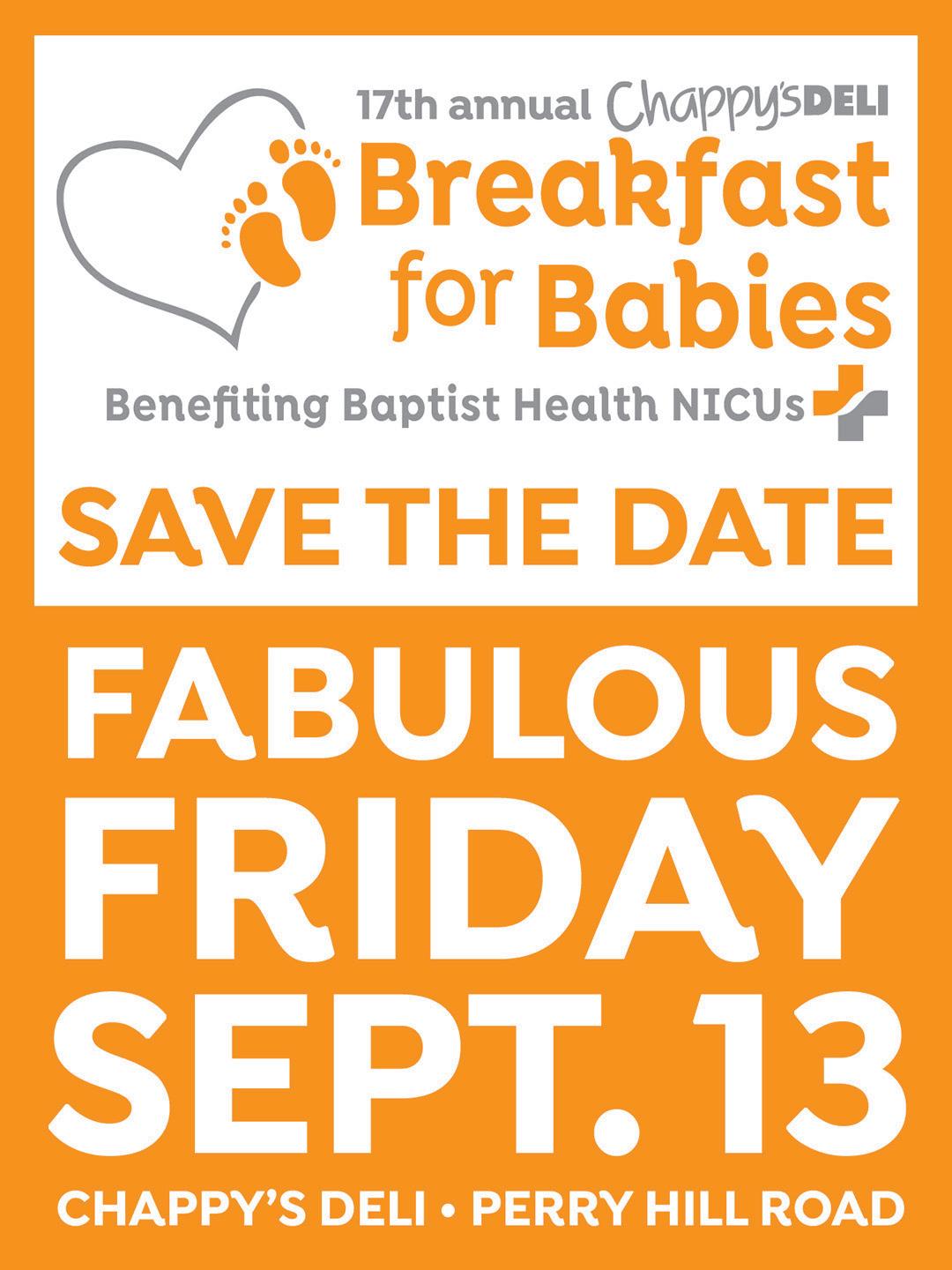



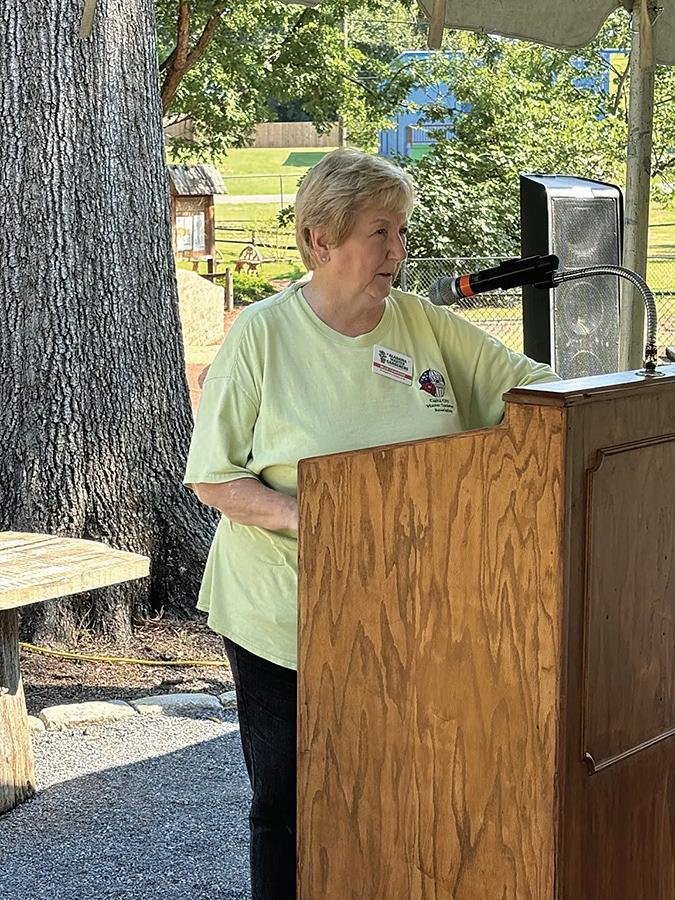
The July sun beat down at the Montgomery Botanical Gardens at Oak Park for the recent class on Building Birdhouses and Feeding Birds, taught by Billie Crawford. Fortunately for participants, the maintenance staff provided a tent to cool the Wisdom Wood outdoor classroom. Mrs. Crawford provided background information of types of birds who nest in the river region area. She also brought a variety of birdhouses and discussed bird housing preferences. The class centered on discussing bluebirds and building a habitat for them. Before sharing the building template, Mrs. Crawford mentioned the following bluebird facts: The Eastern bluebird is most common to the river region area. It will nest all year, but May is the most common time. Eastern bluebirds prefer cavity nesting either in trees or bluebird houses. The male bird selects the nesting spot and flaps his wings to attract the attention of the female. The eggs incubate about 11-19 days, and the babies mature quickly. The birds may mate several times during a season. Bluebirds do not prefer birdfeeders. Instead, they like meal worms. Following the information session, Mrs. Crawford demonstrated how to build a bluebird house. Participants were encouraged to examine the house and ask questions. Due to the heat, there will be no class offered during August. The offerings will resume on Saturday, September 14 with Pottery in the Garden, taught by Margaret Barber. Beginning in September, classes will return to the 10:00 AM time frame for the remainder of the year. Classes are free and open to the public. Water is provided. Visit https://www.montgomerybotanicalgardens.com/
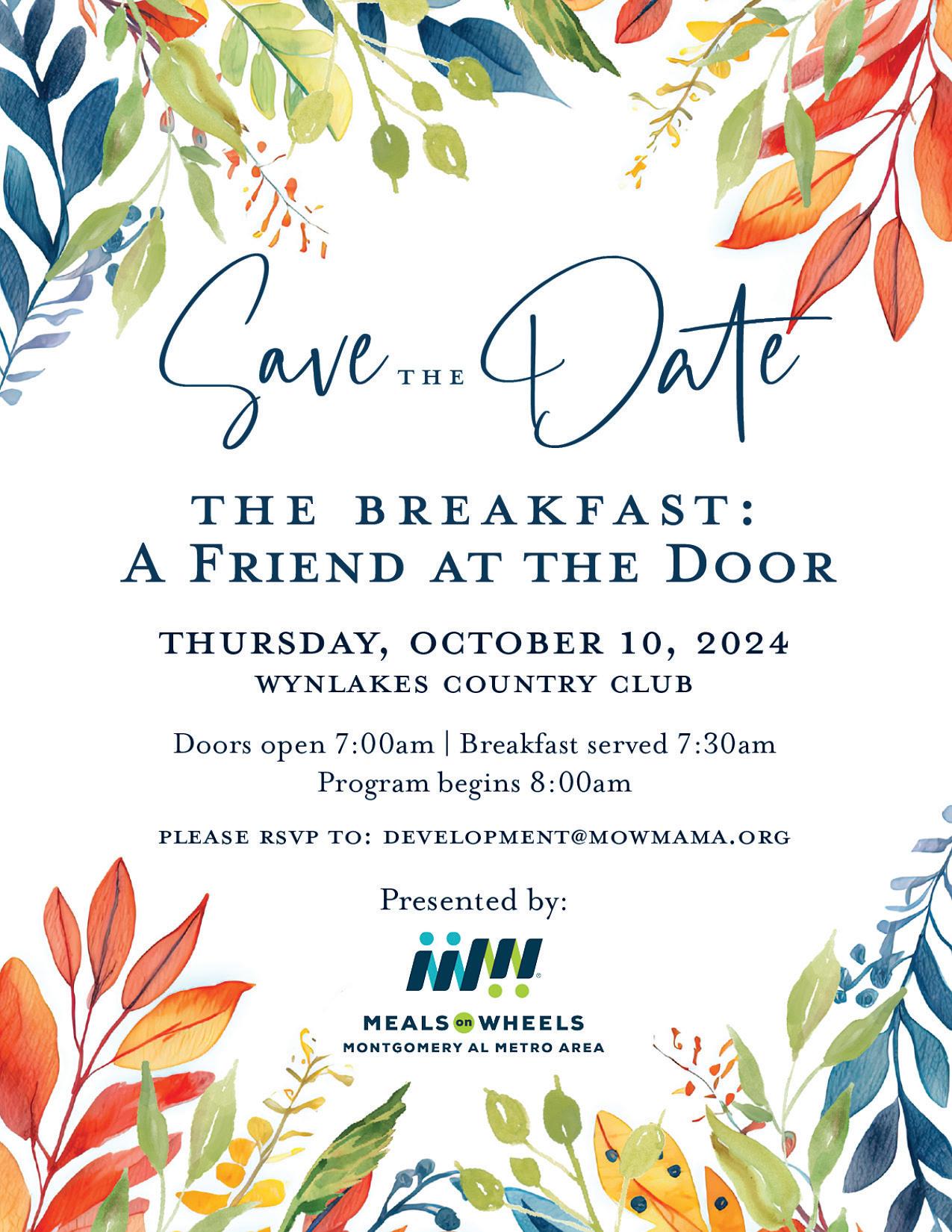

BOOMERS, share your stuff with BOOM! We Love to Bring BOOMERS Together, send
and

Capital City Master Gardener Association presents Lunch & Learn, the 1st Wednesday of Every Month from 12-1 pm. They will meet at Montgomery Cultural Arts Center (Armory Learning Arts Building), 1018 Madison Ave., Montgomery 36104. Mark your calendars, August 7, 2024 “Growing and Using Popular Herbs”. Debbie Boutelier, Advanced Master Gardener, will present “Growing and Using Popular Herbs”. Are you already growing a variety of herbs at home? Do you cook with them? Have you ever tried drying herbs? Can you identify lemongrass or citronella? Join us and discover lots of new things that Debbie will share about herbs!

September 4, 2024 “Japanese Maples in Your Garden”. Rhona Watson, Advanced Master Gardener, will present “Japanese Maples in Your Garden”. Have you always wanted Japanese Maples in your landscape? Do they need sun or shade? What size should I get? Are there various colors to select? Where can they be purchased? Do they all change colors in the Fall? Rhona has lots of answers so be sure to join us! BRING A SACK LUNCH, FREE PROGRAM, WATER PROVIDED, For information, please contact the Montgomery County Extension Office (334) 245-8053. Also visit www.capcitymga.org.




Montgomery Whitewater Park has been named one of Time magazine’s World’s Greatest Places 2024. The Time list recognized 100 destinations to visit around the world based on criteria including success, innovation, relevance and impact. “We are thrilled and honored to be included in such a prestigious roundup, surrounded by so many extraordinary destinations worldwide,” said Jeffrey Gustin, CEO of Montgomery Whitewater Park. “We share this accolade with the partners and leaders who envisioned the park, our staff and the community that has embraced this big idea to make life better through an active outdoor lifestyle.” Montgomery Whitewater Park, which opened a year ago, boasts whitewater activities for enthusiasts and professionals. The park has hosted the U.S. Open Whitewater Championships and the 2024 Canoe Slalom and Kayak Cross Olympic Team Trials. It is the only Alabama destination on Time’s list for 2024.

Alabama has not historically been a destination for whitewater rafters. But now they can paddle the Montgomery Whitewater park, designed by former Olympian and world champion kayaker Scott Shipley and fueled by one of the world’s most advanced man-made, recirculating whitewater channels. One of just three venues of its kind in the U.S., the facility opened in July 2023 with a mission to make outdoor activities and healthy lifestyles accessible to everyone. (Admission is free for visitors just looking to enjoy the green spaces, walking paths, and rollicking whitewater views.) Along with flatwater paddling, whitewater rafting, surfing, and summer camps for kids, free water-safety and beginner kayaking instruction is offered to locals as young as 18 months through partnerships with the Alabama Scenic River Trail and the YMCA. Additional programs to engage women of color with the outdoors in the birthplace of the country’s Civil Rights movement are slated to launch in September. The project has been thoughtfully rendered in other ways, too, including a backwash recovery feature that reduces water loss by 95%, and a system that recaptures and filters the 12 million gallons of water powering the course’s rapids. Future plans for the park include the addition of ziplining, rock climbing and ropes courses, mountain biking trails, and direct access to boating and swimming along Montgomery’s main waterway, the Alabama River, which flows through the heart of downtown. https://montgomerywhitewater.com



I see mermaids as symbols of feminine beauty and strength. My theory is that even (or especially) young girls are drawn to the whole idea of mermaids because archetypically they represent power balanced with maidenly grace.
This month’s cover profile is Debbie Herbert, an author of nearly 20 books who lives in Elmore County. Debbie is one of those rare people who had a dream as a young adult to become a writer, went to college received a journalism degree, and then got sidetracked by taking a job with the Alabama Prison System as a prison guard! Like many of us, we have to go and make a living before we can pursue our dreams. Debbie retired from the prison system and decided to become a writer and became a best-selling author of romance and suspense novels. Was it easy? No, but it has been a rewarding experience that we think you will find interesting and perhaps inspirational; after all, doesn’t everyone want to write a book when they retire!? We hope you enjoy getting to know Debbie as much as we have.
BOOM!: Please give us a brief biography, i.e., where you’re from, your education, what brought you to the Montgomery area, your children, your family, etc.
Debbie: I was born in the small town of Hartsville, South Carolina but lived in several states growing up . . . Ohio, Pennsylvania, Massachusetts, New Jersey, and Georgia. I met my husband, Tim, while attending Berry College in Rome, Georgia. It felt like fate. I had transferred from one class to another, and the only empty seat in the new classroom was beside Tim. It was his last semester of college and my first semester.

Tim became manager of a retail store in the area. With an English major, I struggled to find meaningful employment and we both ultimately landed in Wetumpka after accepting jobs with the State of Alabama. About four years ago, we moved to Titus and enjoy living by Lake Jordan.
such as suspense and romance…?
We moved to Dothan, Alabama when
BOOM!: Debbie, you are an accomplished author living in Elmore County. Please share with our readers when you first realized you wanted to be a writer and how you eventually became one, including your experiences working in the Alabama Prison System for many years. How would you describe your writing themes/genres,

Debbie: Writing a book was always something I dreamed of as a child. I can’t remember a time when I couldn’t read. My parents used to laugh and call me a bookworm. I majored in English in college, fully intending to try my hand at writing. In the first year of our marriage (1979) I wrote a terrible (truly!) romance novel and mailed it to Harlequin. The rejection letter felt crushing, and I sadly stuffed away the amateur manuscript along with the dream. My story is a familiar one. The next season of my life was wrapped up in working full time and raising two sons. It was only after retirement that I renewed my dream after hearing a local author
speak at the Wetumpka Public Library. I realized it’s never too late to go after your goals, and that living in a rural area was no hindrance to the publishing world in the age of the internet.
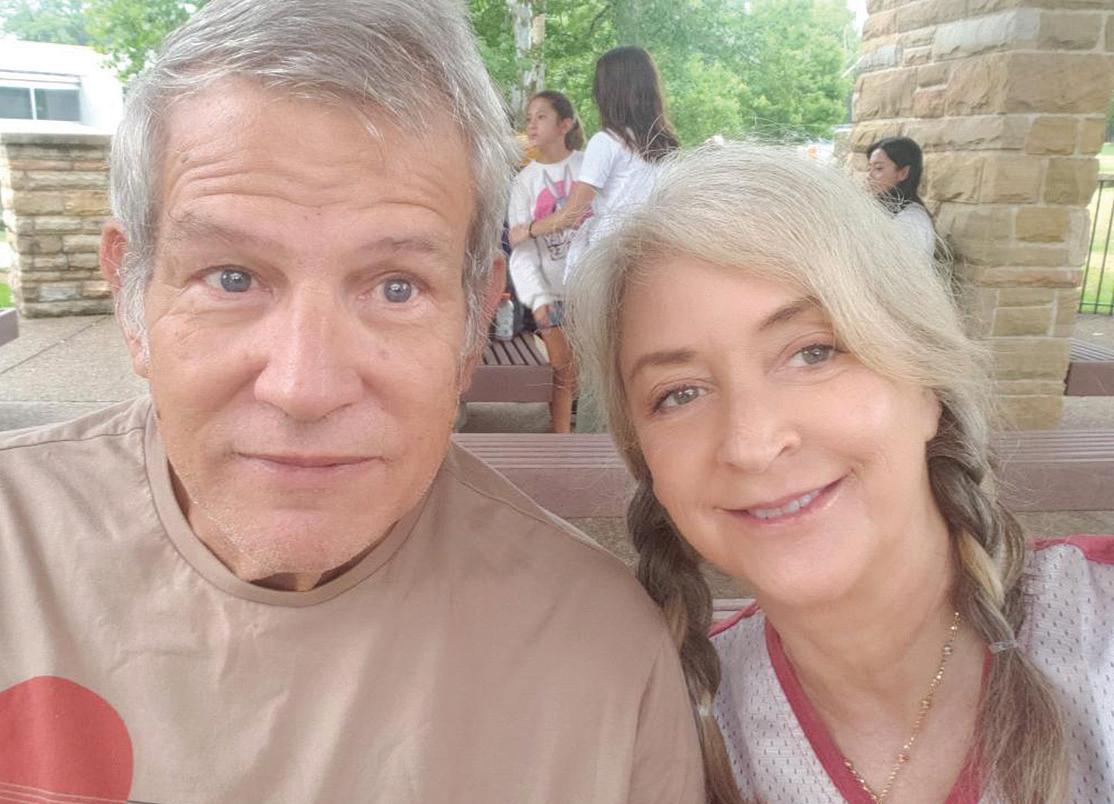
I always thought my experience working in the prison system would lead to a book on true crime but instead I chose to initially write in the romance genre. After over half a dozen published romance novels, I switched interest to the suspense/thriller genre so perhaps the Department of Corrections stint did have an influence on my writing subject after all.
Could you share your fascination with Mermaids?
I see mermaids as symbols of feminine beauty and strength. My theory is that even (or especially) young girls are drawn to the whole idea of mermaids because archetypically they represent power balanced with maidenly grace. Besides, who wouldn’t want to be a beautiful mermaid playing with dolphins all day long? I’ve always loved the ocean and beaches and as a child fantasized about what magic might lay deep beneath the water.
a kick out of watching me ooh and ah over the mermaid performance, along with a crowd of happy, wideeyed little girls.
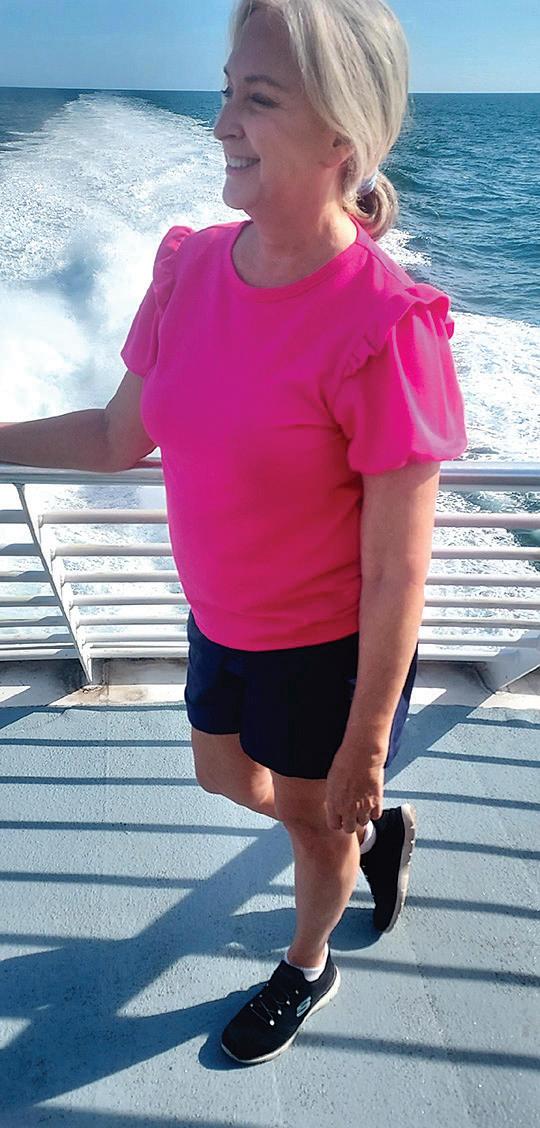
When my husband and I visited Key West
this summer we took the opportunity to catch the mermaid show at Weeki Wachee. Tim got
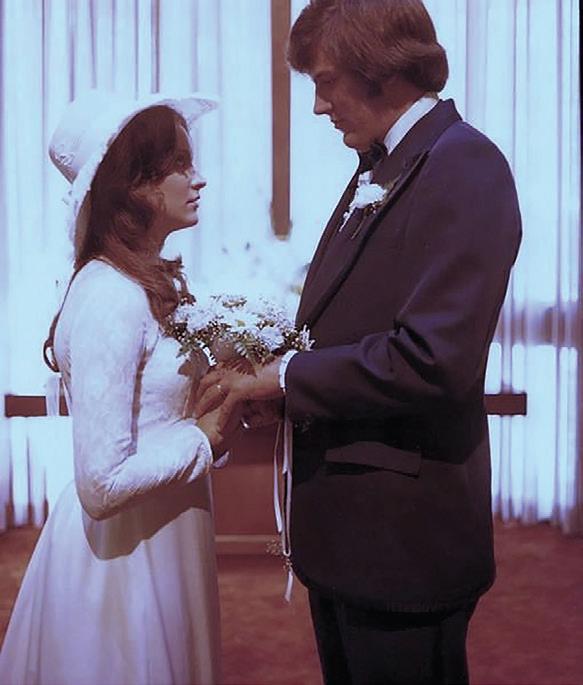
BOOM!: Please describe the process of getting your first book published, including the rejection letters, and the sense of accomplishment you felt. Since then, how many books have you published? What are the titles of some of your favorites, and why? What’s the most gratifying thing about being a published author? What’s the best way for people to buy your books?
Debbie: Oh, the rejections!
Getting an agent and selling a book is a tough, competitive business. I amassed an astonishing number of agent rejections from query letters—over four hundred! I might have set a record.
I realized writing is a business and if I wanted to be traditionally published by a major house, then I needed to learn what made a manuscript marketable. After writing a couple of young adult
novels no one wanted, I switched to a field that, at the time, was more marketable. I wrote an adult paranormal romance and eventually landed an agent. She sold my debut novel, Siren’s Secret, fairly quickly to Harlequin. I wrote about six books in that genre for Harlequin. When the paranormal popularity started to fade, I switched genres again and wrote three romantic suspense novels, also published by Harlequin.
The biggest break in my career came when I tried my hand at a mainstream suspense novel. My agent sold it to Thomas & Mercer (an imprint of Amazon Publishing). The book, Cold Waters, was selected as an Amazon First Reads novel and I wrote two more suspense/thriller novels for Thomas & Mercer.
My favorite, although it didn’t sell as well as the other two thrillers, was the book Scorched Grounds.
Other favorites? I’d have to say Bayou Shadow Hunter, which was a finalist in a national contest, and Not One of Us because I always wanted to portray a
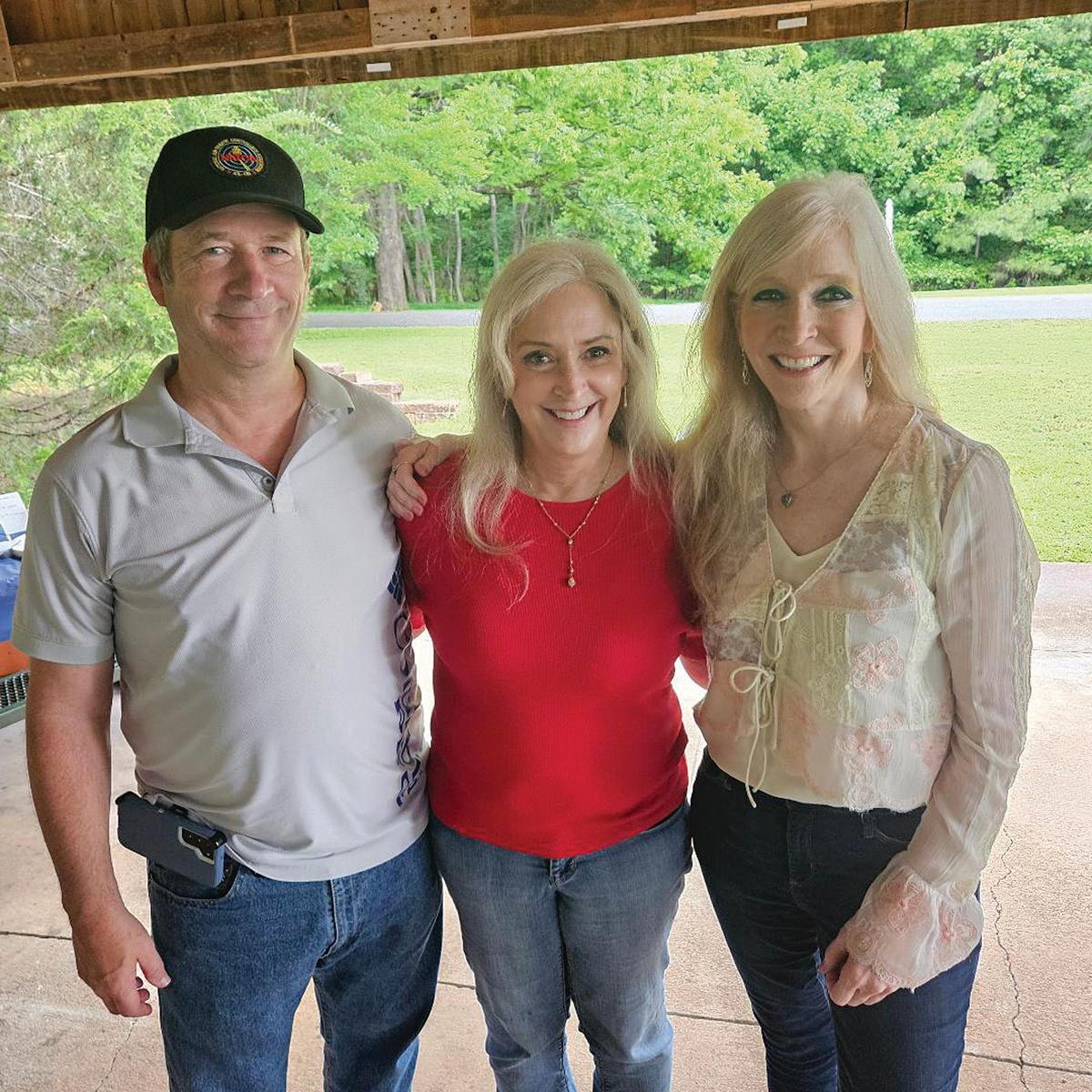
character with synesthesia. Overall, I’ve written about twenty books, almost all are set in Alabama.
The most gratifying aspect of being a writer is hearing from readers who either enjoyed or were touched by something I wrote.
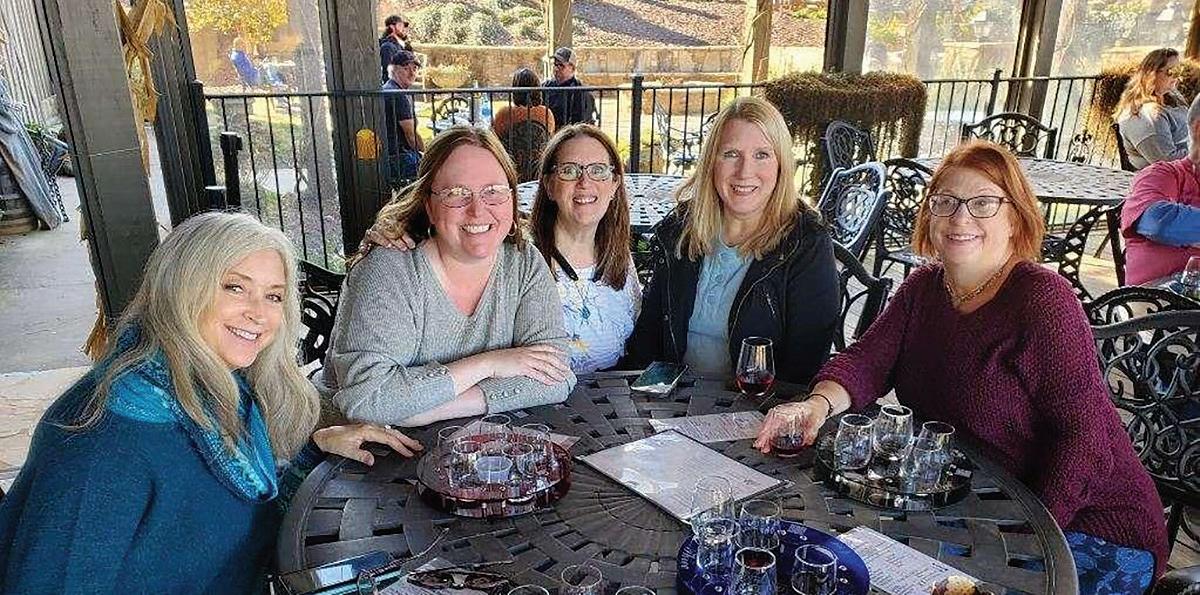
All my books can be found on Amazon, a few are on other online stores like Barnes and Nobles, and five of my books are available on Audible as audiobooks. Local libraries also have some of my books on the shelves.
BOOM!: How would you describe your writing process…outline, research, schedule, time, place, words?
Debbie: My process seems to vary with every novel I write. I’m somewhere between a plotter and a pantser (a writer who writes by the seat of their pants without outlining first). The first two books I wrote were total pantsing
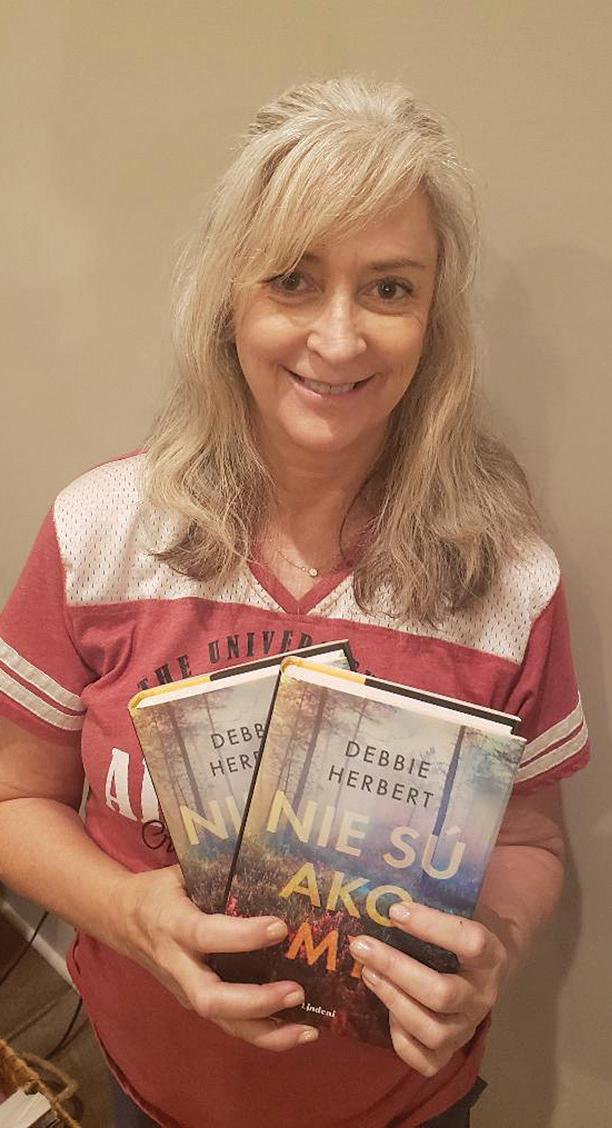
jobs – I didn’t know enough about story structure to plot them out. With the third book, I had success storyboarding, although I quickly learned I didn’t always stick to the outline. Basically, when I storyboard, I buy a huge posterboard, mark it into a square for each chapter, and then fill in scene ideas for each chapter. It helps me remember the plot threads of what has happened, and what needs to take place further in the book. I often color code the scenes too with different colors for differing points of view such as the hero, heroine, or villain. I’m too technologically-
challenged – and impatient – to make spreadsheets and use writing software programs.
With a few of my later books, I abandoned storyboarding and used a simpler plot template/outline in Word for the story structure.
Who are your favorite authors?
Gillian Flynn, Gone Girl and Sharp Objects; Harper Lee, To Kill a Mockingbird; and Jayne Ann Krentz who writes romance novels.
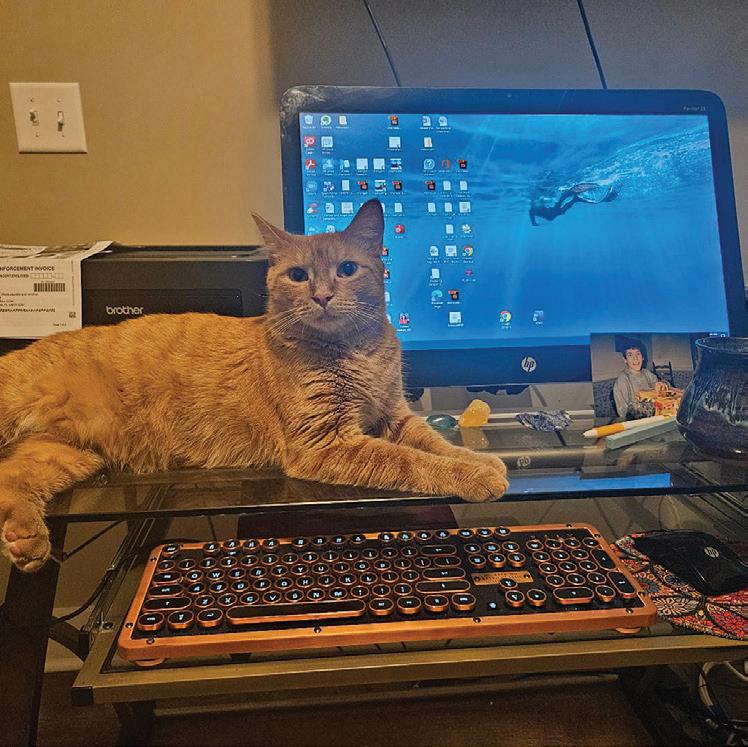
What advice would you share for aspiring writers?
Learn your craft and study the genre you want to publish in. For years, I attended writing conferences and meetings, and took online courses. You also must be open to constructive criticism, willing to work hard, and pursue your goal despite rejections. It helps to meet locally with other writers. I’m in a local group called Novel Chicks that meets once a month to critique each other’s works. Members of this group include Tammy Lynn, Lexi George, Fran Holland, Ash Fitzsimmons and Audrey Jordan.

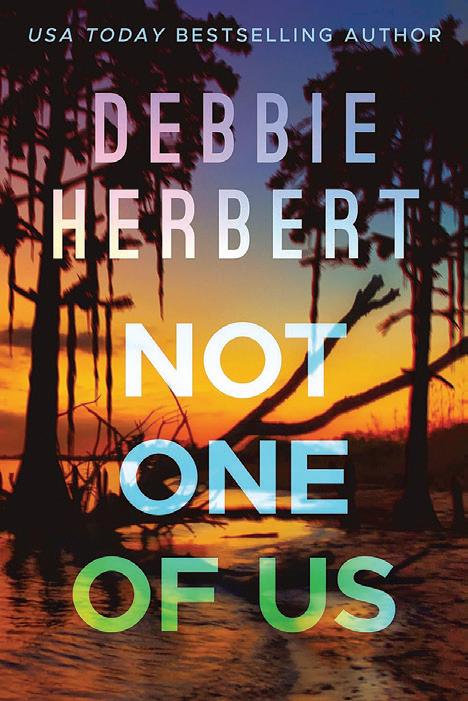

BOOM!: You and your husband have been married for 45 years. Would you share your love story with us? What support does he provide for your writing?
Debbie: Being married to Tim is my greatest love story. I described earlier how we seemed destined to meet. We both knew almost right away that we wanted to spend our lives together. We’ve been though all the ups and downs of life together and I’ve never regretted a moment.
No doubt he is my biggest cheerleader. He always believed I could make it. If ever you meet Tim, be prepared for him to pull out his cell phone and show you my author photo! Over the years, he’s helped me brainstorm when I got stuck in plot ideas and put up with sandwiches for supper when I was busy writing.
BOOM!: Do you have time to be involved in the community, church, or civic organizations?
Debbie: When I first retired, I went through the Master Gardner’s course and volunteered a long time at Lanark Gardens in Millbrook. My most recent volunteer work was with Samaritan’s Purse. A group of us from Wetumpka spent a day in one of their rented warehouses, assembling shoe boxes for children who would otherwise not receive any Christmas gifts. I’d like to become involved in some kind of work with people suffering with grief bereavement.
BOOM!: What are you most passionate about?
Debbie: I truly believe love is magical, pizza and diet Coke are dietary staples, college football rules, and that cats are the coolest creatures roaming the planet.
BOOM!: What do you like about living in the Wetumpka/River Region area? What do we need more of?
Debbie: The people are the best part!
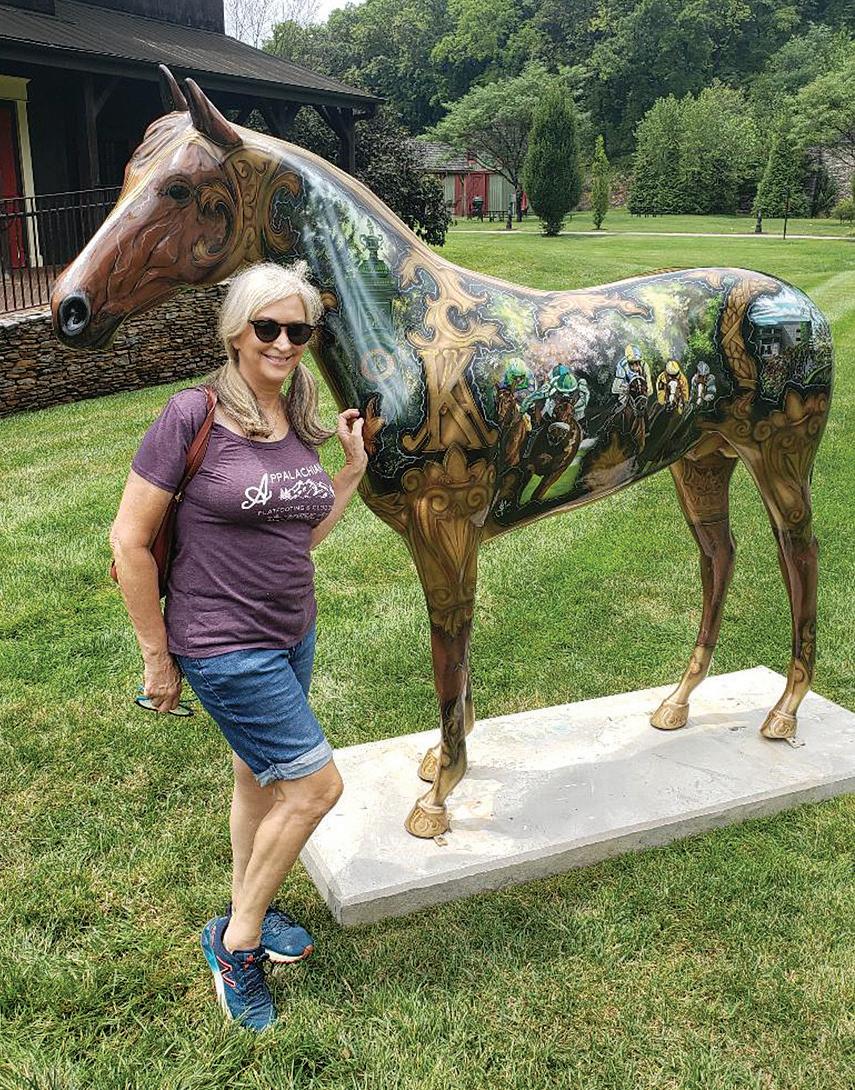
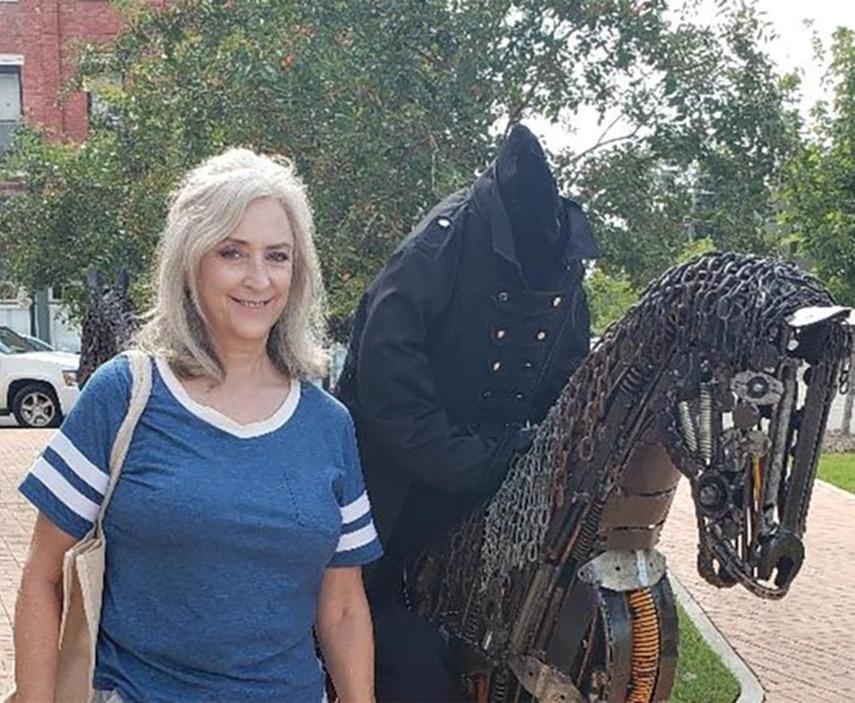
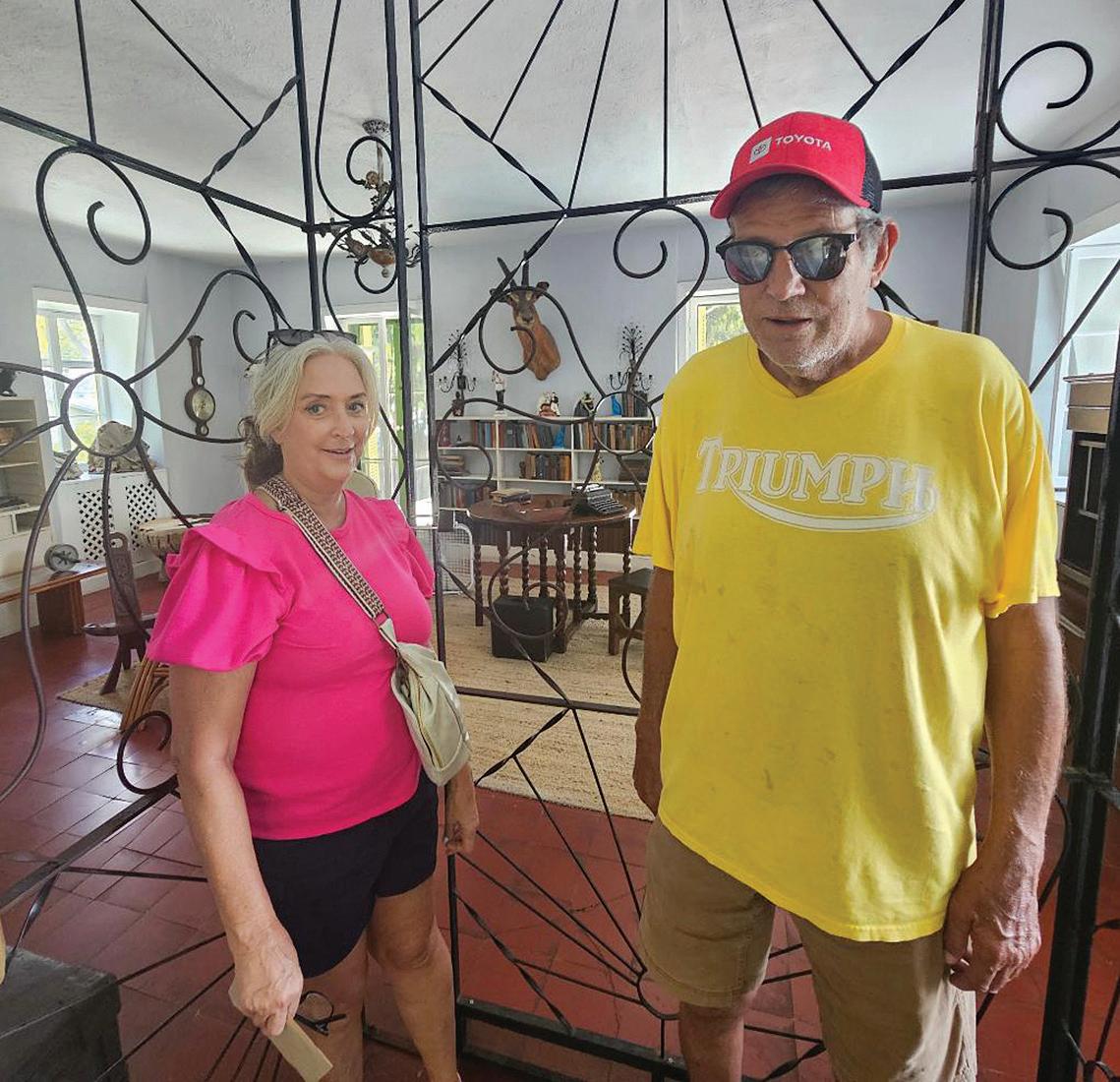
It’s what makes a home beloved. As southerners, I believe we carry a strong sense of place. As far as improvement, I’d love to have a huge indoor aqua center for year-round swimming and physical therapy.
BOOM!: How do you like to relax and wind down from a full day of activity?
Debbie: The usual . . . soaking in a hot tub, a late afternoon boat ride, watching television and, of course, reading.
BOOM!: How do you like to spend time with family and friends?
Debbie: I’m very low key. Some of the best times are just spent talking or watching football together. (Roll Tide!) I also enjoy annual retreats with a group of writer friends.
BOOM!: Many people, as they age, experience a renewed sense of purpose, new goals, etc. How would you describe this sense of renewal in your life? Any advice for the rest of us seeking renewal?
Debbie: For many years, my purpose in life was raising children, being a good wife, a good employee and then a decade of writing books. As we age, we become increasingly vulnerable to the experience of losing loved ones.
This happened to us when our oldest son died unexpectedly from a stroke in October 2023. My world was thrown upside down and it’s been a journey to find new meaning in life. For me, I’ve found renewal in grief therapy and Christian support groups with others who’ve been through this same trauma.
Renewal will look different for everyone. I encourage you to remember that there is strength and support in community with others.
BOOM!: What are some of your favorite travel experiences? Favorite getaway spot? Are any travel dreams planned?


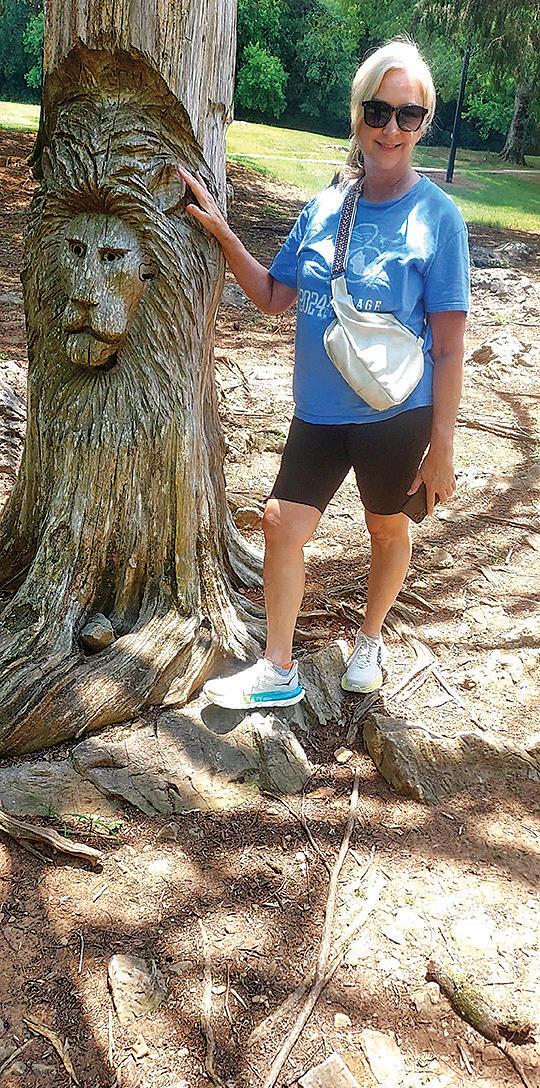
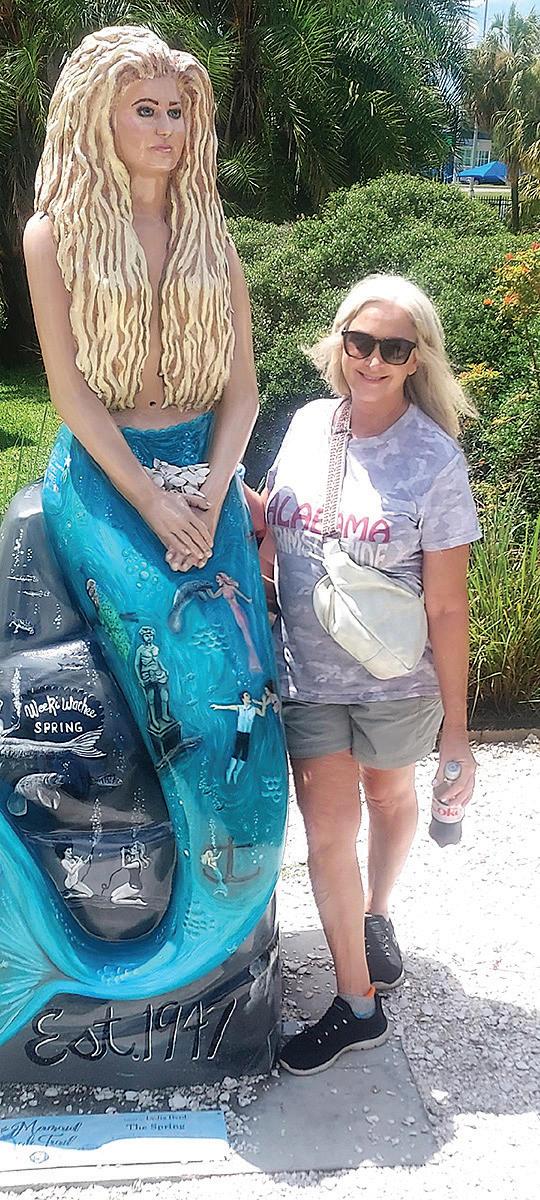
Debbie: I would have to say our honeymoon cruise to the Bahamas was my favorite trip. Hard to top that! I have fond memories of going to Myrtle Beach during childhood summers and visiting Kentucky last year was fun. We plan on touring Alaska very soon. I’ve never met a single person who’s been there and didn’t highly recommend going.
BOOM!: As you’ve aged, how have your priorities changed? How would you describe what it means to “age well”? What are your thoughts on retirement?
I’m at a season in my life where I’m no longer striving to compete in a crowded field. Instead, I’m grateful for whatever success I’ve achieved and now enjoy relaxing and spending time doing hobbies. When I write these days, it’s very casual and I’m no longer in a rush to meet deadlines.
Retirement can be whatever you choose. Initially, it was an opportunity to revisit a childhood dream and start what became a second career.
BOOM!: Do you have any hobbies or other activities that grab your attention?
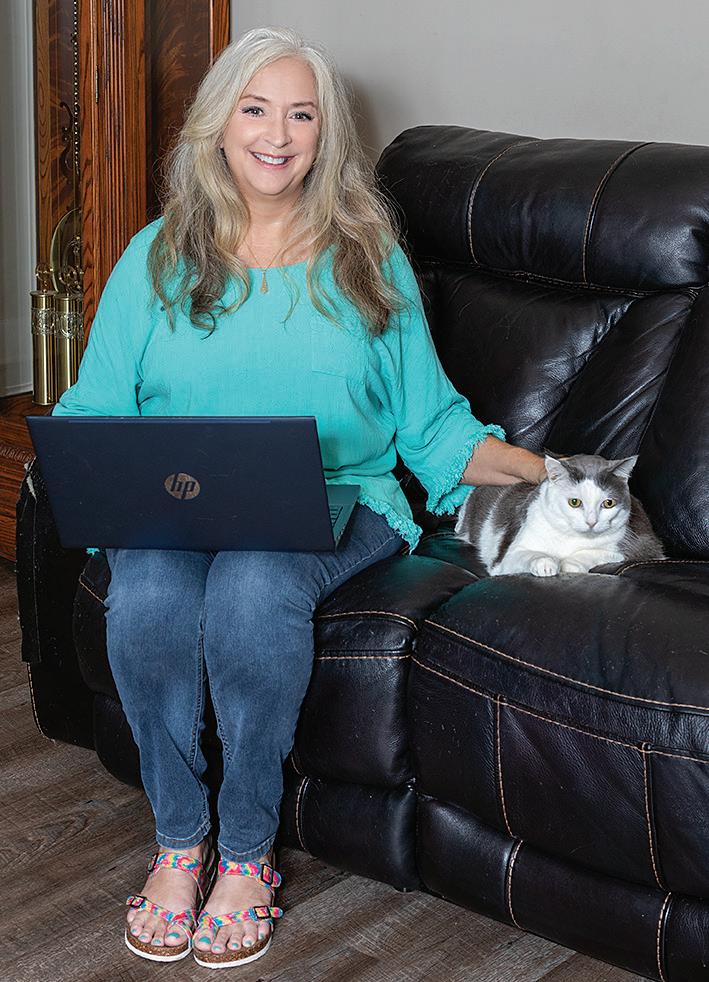
Debbie: I enjoy working out most mornings at the Wetumpka YMCA as well as visiting family and friends.
BOOM!: What future challenges are you contemplating for your writing career? For yourself?
Debbie: I’d like to edit and publish some
poems I wrote years ago—just for the fun of it. I also have a work-in-progress that’s a romantic suspense set in Appalachia about a young woman who returns there seeking answers to her parents’ murders and the disappearance of her sister.
BOOM!: Give us three words that describe you.
Debbie: Creative, introspective, loyal.
We want to thank Debbie for sharing some of her life's story with us this month. Debbie has pursued her dreams and it certainly has helped her age well when she overcame the challenges along the way. We're proud to share her story. We hope you’ll share Debbie's story with friends and family; they’ll enjoy the reading experience. If you want to reach out to Debbie, please email her at deb_herbert@yahoo.com. Thanks to DiAnna Paulk and her creative photography skills. If you have questions, comments, or suggestions about our cover profiles, including nominating someone, please text them to Jim Watson at 334.324.3472 or email jim@riverregionboom.com
Thanks for Reading BOOM!
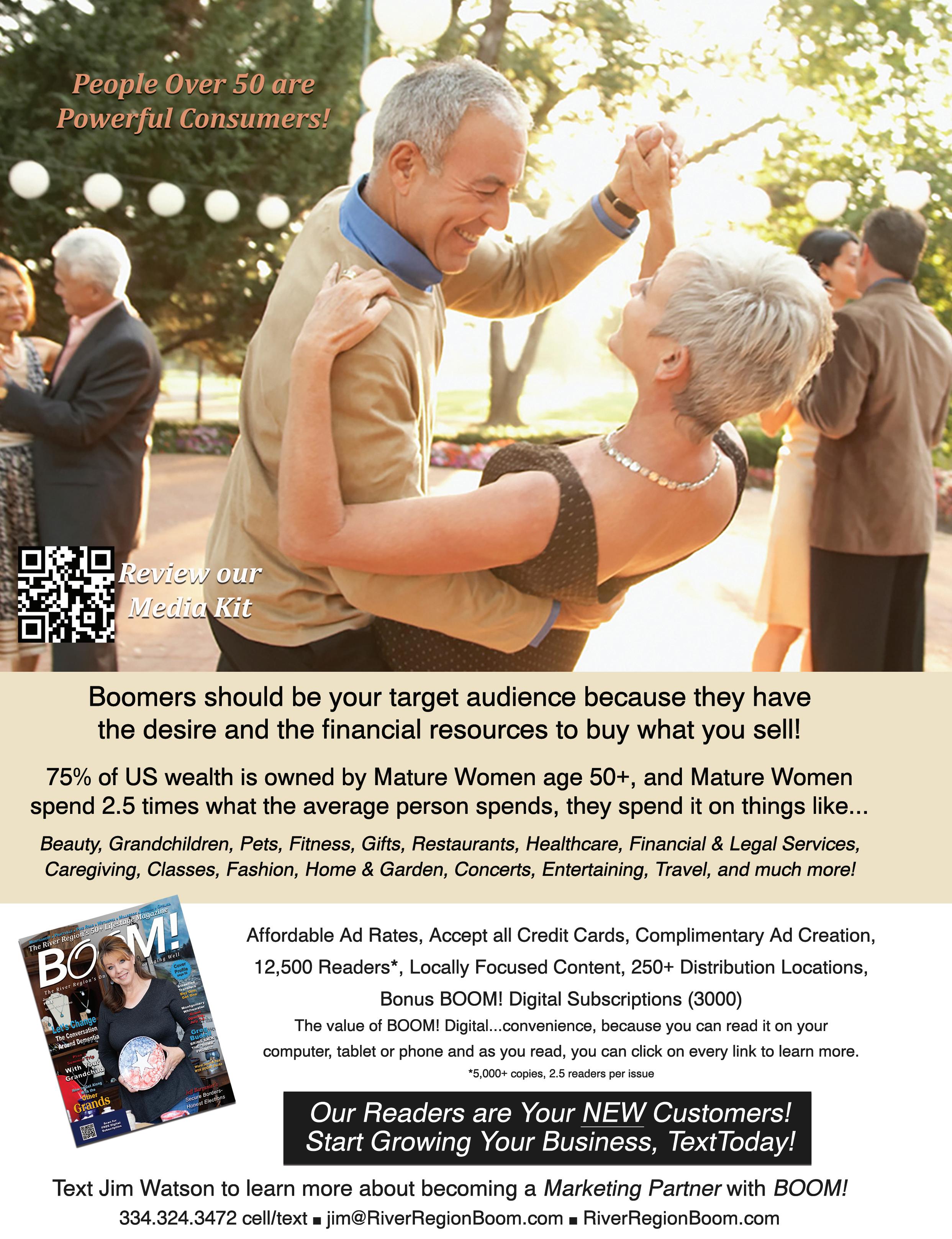
Not a subject often up for discussion, for many reasons – smelly feet, nail fungus, ingrown toenails, calluses, corns, bunions, blisters, dry skin, cracked skin, plantar warts, athletes foot…none of these things are pleasant and the list seems to be very long (and this is not a complete list by any means). There are SO many things that can go wrong with your feet and let’s face it, where would we be without them? It would seem that taking good care of your feet should be one of the primary concerns of, well, everybody and yet…it’s not.

your nervous system.
Problems with your feet can in turn lead to problems elsewhere in your body, your legs and back for example, as you try to compensate for the pain in your feet by using other muscles in ways they were not designed to be used. Thus, good foot care leads to better overall health; so, let’s look at how you can take good care of those feet using natural essential oils and hydrosols in the comfort of your own home.
First of all, some basics that we can all do –
1) Wear well-fitting shoes! Supportive –good arch support and a cushioned sole. Nothing too tight.
2) Keep hydrated – many foot issues are caused by dry skin on the feet, which can be helped by being well-hydrated. This is, of course, beneficial for your skin all over your body.
3) Eat a healthy, well-balanced diet. Rich in vitamins and minerals – think about the color on your plate! Again, this supports your skin in general, not just on your feet! It also supports muscles and
4) Regular maintenance – trimming toenails, moisturizing and exfoliating are essential for keeping feet in good condition.
Depending on how much time you spend on your feet in a day will determine how often you want/need to do things like a foot soak, but other things like a foot scrub and massage we can all benefit from on a weekly basis.
I love to use Epsom salts in a foot scrub, because of the high magnesium content (and other minerals) in it; other people prefer Himalayan salt or use any other salt you have handy! The purpose is to scrub off the dead skin and reveal the newer softer skin beneath. Adding a carrier oil, such as jojoba or olive oil helps to moisturize the skin and certain essential oils will add other benefits, such as the anti-bacterial properties of tea-tree or the relaxing properties of lavender.
As a rough guide, for each 4oz of salt add about a tablespoon of carrier oil and 15-20 drops of essential oils. Peppermint is cooling and will help relieve tired
achy feet; it also helps combat foot odor, but don’t use more than 2-3 drops of peppermint, it is VERY POTENT. Lemon is anti-fungal and therefore great for treating athletes’ foot; like any citrus scent it is also very mood uplifting. Cypress oil can help reduce swelling and helps improve overall circulation.
After you’ve scrubbed and rinsed with warm water, pat your feet dry and layer on a massage oil – it can be the same carrier oil and essential oil combination you just used in your scrub, or you can switch it up if you like. Massage your feet starting at your toes, gently pull and stretch each toe, then move onto the sole, working in circular motions with your thumbs. Apply gentle pressure to your arches and use your fingers to gently stroke across the tops of your feet from your toes to your ankles.
Lastly, gently rub a thick moisturizing cream over the oil to help “seal” it in and push the oils down into the epidermis. If you can do this sequence every week, you will have fabulous feet!
On a daily basis, a deodorizing and antibacterial foot spray, followed by a light moisturizer would be a great addition particularly in the summer months. A hydrosol base, German Chamomile for example, would be a real feet treat. You can add essential oils to this base for additional support, or just leave it as it is. Just try and work out something you feel comfortable with in your daily and/or weekly routine. It’s not just your feet that will thank you for it.
email: nyrbhalla@gmail.com I web: us.nyrorganic.com/shop/tracybhalla I www. LogHouseAromatics.com
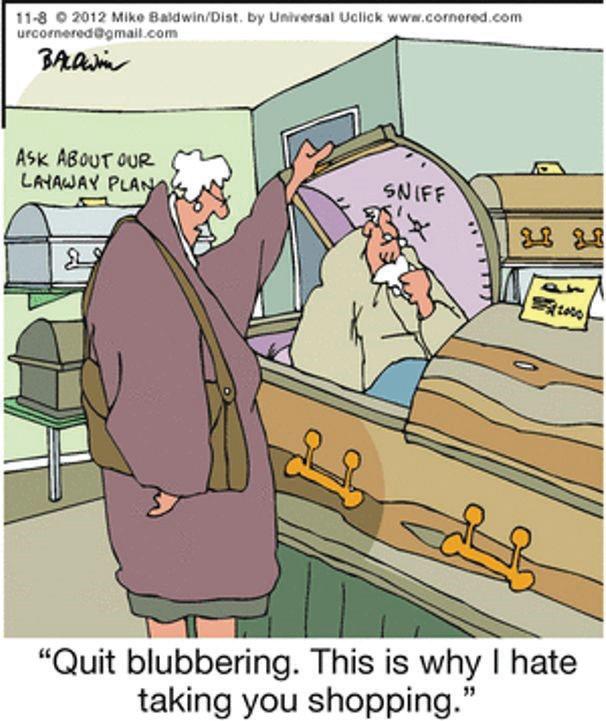
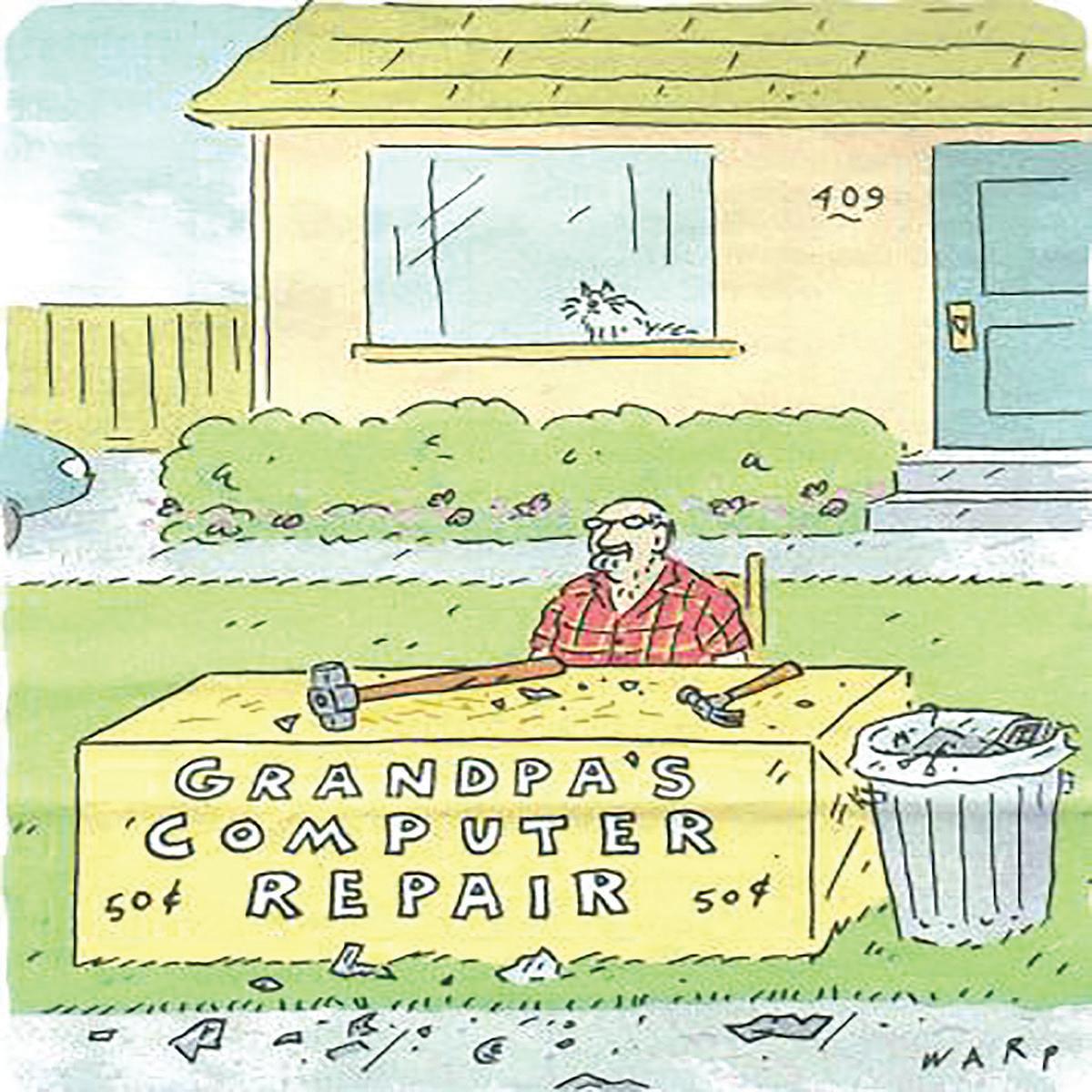


When is the last time you reviewed your estate plan? Do you have a will? According to a recent survey by the ¹Harris Poll, 64% of Americans do not have a will. Why? The most common reason mentioned was that “they hadn’t gotten around to it yet.” If you have a will, when is the last time you reviewed it? Due to estate law changes in the last five years, there is a good possibility that a will that was drafted more than five years ago needs to be revised.
In addition, when is the last time you reviewed your beneficiary designations in your 401(k)s, IRAs, life insurance policies and annuities? One of the most common estate planning mistakes is not making sure that beneficiary designations are in order. Many people believe that the will governs everything about their estate and don’t worry about regularly reviewing their various beneficiary designations. In fact, if your beneficiary designations differ from what is expressed in your will, the beneficiary designations specified in your retirement plans or insurance policies will trump the will.
Every August, Susan Moore of Moore Wealth Management in Montgomery, conducts a free estate planning workshop in a Webinar format. The workshop covers a number of issues, including a review of the various legal documents involved in estate planning such as wills, durable powers of attorney, advanced healthcare directives, revocable and irrevocable trusts. Beneficiary designations are a great tool, properly used, in estate planning.

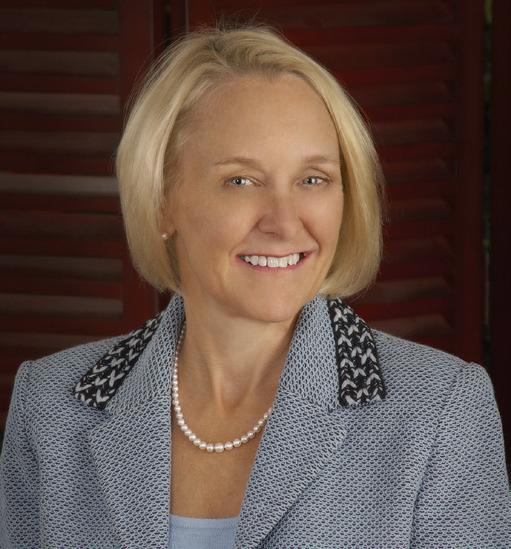
By Susan Clayton Moore, J.D. Principal of Moore Wealth Management, Inc.
They are flexible and can be changed without having to re-do legal documents to reflect family changes such as births, deaths and divorces. The workshop covers how to use these beneficiary designations properly, including primary and contingent beneficiaries and per capita or per stirpes distributions.
In addition, the Webinar offers attendees a template of how to conduct a family meeting at which you communicate to your family and heirs your plans and intentions around the distribution of your assets. A vital part of this meeting is to define the roles and responsibilities of your various heirs as well as general instructions, including the location of key documents, burial wishes and intentions for tangible personal property.
These methods will be covered in a Webinar format on Wednesday, August 28th by Susan Moore of Moore Wealth

Management, Inc. at 12 p.m. Please call 334.270.1672, or email sarah@ moorewealthmanagement.com, for more information and reservations.
We conduct a variety of workshops and seminars at MWM. The mission statement of MWM is very simple: “and then some.” We attempt to do what is expected, what is required “and then some”. The Putting Your Estate in Order workshop is part of our monthly “and then some” workshops. In addition, MWM conducts daily current events market updates that attempt to explain what is going on in the financial world. If you would like to be on the mailing list or receive email notifications of upcoming webinars, please call 334.270.1672.
Susan Clayton Moore, J.D., is a financial advisor and wealth manager of Moore Wealth Management, Inc., with offices in Montgomery and Alexander City, AL. Susan has under advisement over $170 million (as of 1.21.2022) in brokerage and advisory assets through Kestra Financial and has been a financial planner over 40 years. Contact Susan at 334.270.1672. Email contact is susan@moorewealthmanagement.com
The opinions expressed in this commentary are those of the author and may not necessarily reflect those held by Kestra Investment Services, LLC or Kestra Advisory Services, LLC. This is for general information only and is not intended to provide specific investment advice or recommendations for any individual. It is suggested that you consult your financial professional, attorney or tax advisor regarding your individual situation.
Securities offered through Kestra Investment Services, LLC (Kestra IS), member FINRA/SIPC. Investment Advisory Services offered through Kestra Advisory Services, LLC (Kestra AS), an affiliate of Kestra IS. Kestra IS or Kestra AS are not affiliated with Moore Wealth Management, Inc. https://bit.ly/KF-Disclosures
¹https://www.usatoday.com/story/money/ personalfinance/2015/07/11/estate-plan-will/71270548/


